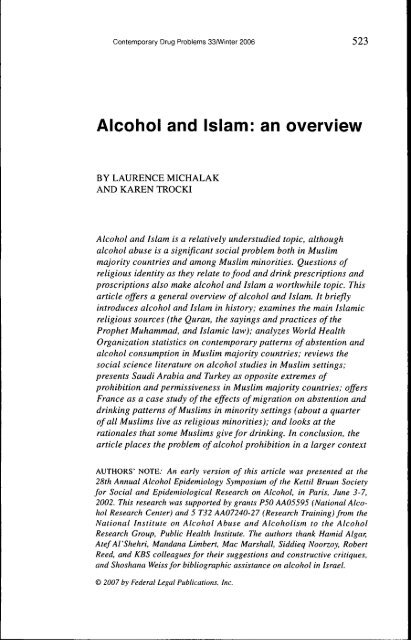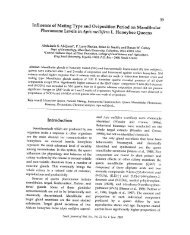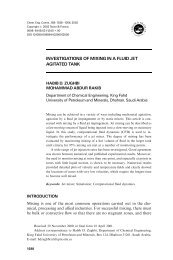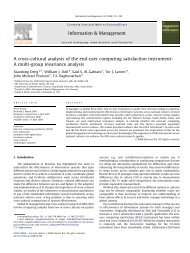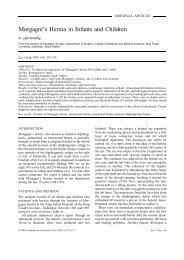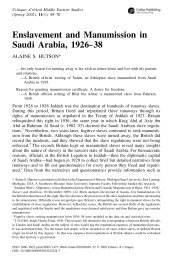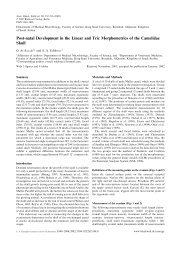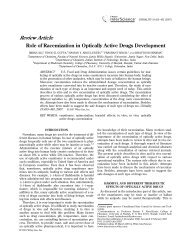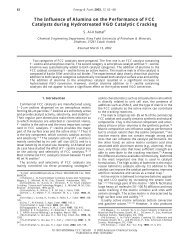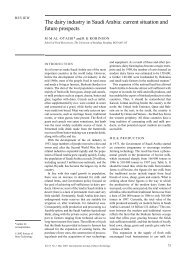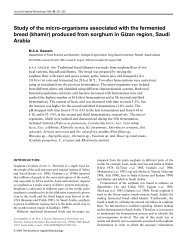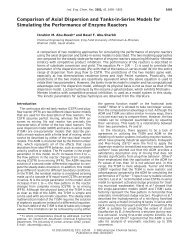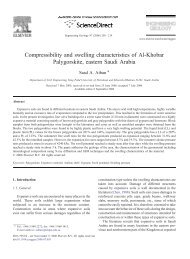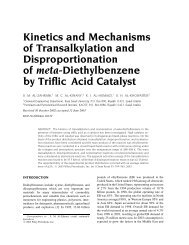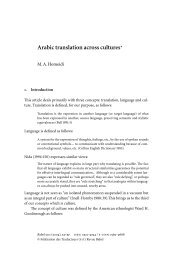Alcohol and Islam: an overview
Alcohol and Islam: an overview
Alcohol and Islam: an overview
You also want an ePaper? Increase the reach of your titles
YUMPU automatically turns print PDFs into web optimized ePapers that Google loves.
Contemporary Drug Problems 33/Winter 2006 523<br />
<strong>Alcohol</strong> <strong><strong>an</strong>d</strong> <strong>Islam</strong>: <strong>an</strong> <strong>overview</strong><br />
BY LAURENCE MICHALAK<br />
AND KAREN TROCKI<br />
<strong>Alcohol</strong> <strong><strong>an</strong>d</strong> <strong>Islam</strong> is a relatively understudied topic, although<br />
alcohol abuse is a signific<strong>an</strong>t social problem both in Muslim<br />
majority countries <strong><strong>an</strong>d</strong> among Muslim minorities. Questions of<br />
religious identity as they relate to food <strong><strong>an</strong>d</strong> drink prescriptions <strong><strong>an</strong>d</strong><br />
proscriptions also make alcohol <strong><strong>an</strong>d</strong> <strong>Islam</strong> a worthwhile topic. This<br />
article offers a general <strong>overview</strong> of alcohol <strong><strong>an</strong>d</strong> <strong>Islam</strong>. It briefly<br />
introduces alcohol <strong><strong>an</strong>d</strong> <strong>Islam</strong> in history; examines the main <strong>Islam</strong>ic<br />
religious sources (the Qur<strong>an</strong>, the sayings <strong><strong>an</strong>d</strong> practices of the<br />
Prophet Muhammad, <strong><strong>an</strong>d</strong> <strong>Islam</strong>ic law); <strong>an</strong>alyzes World Health<br />
Org<strong>an</strong>ization statistics on contemporary patterns of abstention <strong><strong>an</strong>d</strong><br />
alcohol consumption in Muslim majority countries; reviews the<br />
social science literature on alcohol studies in Muslim settings;<br />
presents Saudi Arabia <strong><strong>an</strong>d</strong> Turkey as opposite extremes of<br />
prohibition <strong><strong>an</strong>d</strong> permissiveness in Muslim majority countries; offers<br />
Fr<strong>an</strong>ce as a case study of the effects of migration on abstention <strong><strong>an</strong>d</strong><br />
drinking patterns of Muslims in minority settings (about a quarter<br />
of all Muslims live as religious minorities); <strong><strong>an</strong>d</strong> looks at the<br />
rationales that some Muslims give for drinking. In conclusion, the<br />
article places the problem of alcohol prohibition in a larger context<br />
AUTHORS' NOTE.- An early version of this article was presented at the<br />
28th Annual <strong>Alcohol</strong> Epidemiology Symposium of the Kettil Bruun Society<br />
for Social <strong><strong>an</strong>d</strong> Epidemiological Research on <strong>Alcohol</strong>, in Paris, June 3-7,<br />
2002. This research was supported by gr<strong>an</strong>ts P50 AA05595 (National <strong>Alcohol</strong><br />
Research Center) <strong><strong>an</strong>d</strong> 5 T32 AA07240-27 (Research Training) from the<br />
National Institute on <strong>Alcohol</strong> Abuse <strong><strong>an</strong>d</strong> <strong>Alcohol</strong>ism to the <strong>Alcohol</strong><br />
Research Croup, Public Health Institute. The authors th<strong>an</strong>k Hamid Algar,<br />
Atef Al'Sliehri, M<strong><strong>an</strong>d</strong><strong>an</strong>a Limbert, Mac Marshall, Siddieq Noorzoy, Robert<br />
Reed, <strong><strong>an</strong>d</strong> KBS colleagues for their suggestions <strong><strong>an</strong>d</strong> constructive critiques,<br />
<strong><strong>an</strong>d</strong> Shosh<strong>an</strong>a Weiss for bibliographic assist<strong>an</strong>ce on alcohol in Israel.<br />
© 2007 by Federal Legal Publications, Inc.
524 ALCOHOL AND ISLAM<br />
of how to approach food <strong><strong>an</strong>d</strong> drink prescriptions <strong><strong>an</strong>d</strong> proscriptions;<br />
it also cautions against overestimating the influence of <strong>Islam</strong>, <strong><strong>an</strong>d</strong><br />
suggests <strong>an</strong> agenda for future studies of alcohol-related beliefs <strong><strong>an</strong>d</strong><br />
behaviors among Muslims.<br />
Which is the worst deed: to kill a m<strong>an</strong>, to rape a wom<strong>an</strong>, or to<br />
get drunk? Drunkenness is the worst because the drunkard<br />
will commit both rape <strong><strong>an</strong>d</strong> murder.<br />
—<strong>Islam</strong>ic saying (Aziz Omr<strong>an</strong>e,<br />
personal communication, Tunis 1992)<br />
Given the vast literature of books <strong><strong>an</strong>d</strong> journals specialized in<br />
the study of alcohol, the existing scholarship on <strong>Islam</strong> <strong><strong>an</strong>d</strong><br />
alcohol seems small. It consists of a modest number of publications<br />
about alcohol-related attitudes <strong><strong>an</strong>d</strong> behaviors of<br />
Muslims <strong><strong>an</strong>d</strong> about alcohol in <strong>Islam</strong>ic doctrine—the former<br />
from a social science perspective <strong><strong>an</strong>d</strong> the latter from a religious<br />
doctrinal perspective. Since Muslims constitute about a<br />
fifth of the world's population—about 1.3 billion people—this<br />
would appear to be <strong>an</strong> underdeveloped area within alcohol<br />
studies. The paucity of research in this subfield is in a way not<br />
surprising because alcohol is forbidden in <strong>Islam</strong> <strong><strong>an</strong>d</strong> Muslim<br />
countries tend to have low rates of alcohol consumption. Yet<br />
the topic is import<strong>an</strong>t, in part because alcohol abuse among<br />
Muslims is a signific<strong>an</strong>t social problem, both in Muslim countries<br />
<strong><strong>an</strong>d</strong> among Muslims in countries where they are a minority,<br />
but also because of other considerations besides social<br />
pathology that make alcohol <strong><strong>an</strong>d</strong> <strong>Islam</strong> a timely topic.<br />
This article offers <strong>an</strong> <strong>overview</strong> of the topic of alcohol <strong><strong>an</strong>d</strong><br />
<strong>Islam</strong>, addressing such questions as: What are the patterns of<br />
alcohol consumption in Muslim countries? What does the<br />
social science literature teach us about alcohol <strong><strong>an</strong>d</strong> Muslims?
525<br />
What normative behaviors with regard to alcohol are prescribed<br />
by <strong>Islam</strong>ic textual sources <strong><strong>an</strong>d</strong> how did these norms<br />
evolve? What is the r<strong>an</strong>ge of practice of Muslims with regard<br />
to alcohol consumption in different parts of the worid today,<br />
in both <strong>Islam</strong>ic majority countries <strong><strong>an</strong>d</strong> in countries in which<br />
Muslims are a minority? What happens when Muslims emigrate<br />
from a country where alcohol is discouraged to a country<br />
where alcohol is permitted <strong><strong>an</strong>d</strong> even positively valued?<br />
Since <strong>Islam</strong> forbids alcohol, how do Muslims who drink<br />
explain their behavior? We conclude with <strong>an</strong> agenda for suggested<br />
future studies of alcohol-related beliefs <strong><strong>an</strong>d</strong> behaviors<br />
of Muslims.<br />
<strong>Alcohol</strong> <strong><strong>an</strong>d</strong> <strong>Islam</strong> in history<br />
Paradoxically, it was Muslim chemists who were responsible<br />
for developing distillation to a high level of sophistication <strong><strong>an</strong>d</strong><br />
tr<strong>an</strong>smitting it to Europe via Spain. Although distillation is a<br />
process which arose independently in different places in the<br />
world, Muslims greatly improved distillation technology. In<br />
the eighth century Muslims developed that distinctively<br />
shaped apparatus which is a staple of every chemistry laboratory—the<br />
alembic—for the efficient collection of distillate<br />
through a descending condensation tube. The words "alembic"<br />
<strong><strong>an</strong>d</strong> "alcohol" both came into English from Arabic (a/- is the<br />
prefix "the" in Arabic). The word "alcohor' comes from alkuhul,<br />
Arabic for "powdered <strong>an</strong>timony," or "a fine powder,"<br />
later "essence," <strong><strong>an</strong>d</strong> still later alcool vini,, shortened in the<br />
nineteenth century to "alcohol." Muslims also developed <strong><strong>an</strong>d</strong><br />
introduced into Europe the cultivation of sugar c<strong>an</strong>e <strong><strong>an</strong>d</strong> <strong>an</strong><br />
efficient process for sugar extraction which, combined with<br />
distillation technology, gave birth to the production of rum.<br />
Despite its formal religious prohibition, the consumption of<br />
alcohol has never been eradicated under <strong>Islam</strong>. The continuing<br />
import<strong>an</strong>ce of alcohol c<strong>an</strong> be seen through the literatures of<br />
the areas to which <strong>Islam</strong> spread. In both Arabic <strong><strong>an</strong>d</strong> Persi<strong>an</strong>
526 ALCOHOL AND ISLAM<br />
poetry the consumption of alcohol remained <strong>an</strong> import<strong>an</strong>t<br />
theme, even after the introduction of <strong>Islam</strong>. In the Arab world<br />
this is attested by the flourishing genre of khamriyya (wine, or<br />
bacchic) poetry <strong><strong>an</strong>d</strong> the work of the ibahi (licentious) poets.<br />
Abu Nuwas is perhaps the most famous of these early poets<br />
who glorified wine <strong><strong>an</strong>d</strong> drunkenness. Wine also figures prominently<br />
in the work of Hisp<strong>an</strong>o-Arabic poets of the tenth to the<br />
fifteenth centuries, such as the Cordob<strong>an</strong> zajal poet Ibn<br />
Quzm<strong>an</strong>, the satirical muwashshahat poet al-Abyad (who was<br />
crucified by the Almoravid governor of Cordoba), Ibn Bajja of<br />
Saragossa, <strong><strong>an</strong>d</strong> Ibn Zuhr (the latter two both were poisoned).<br />
In this poetry, alcohol is often associated with other vices,<br />
such as homoeroticism with h<strong><strong>an</strong>d</strong>some cupbearers (Monroe<br />
1974). The Persi<strong>an</strong>s had a flourishing genre of wine poetry<br />
before <strong><strong>an</strong>d</strong> after <strong>Islam</strong>—with Sadi, the ghazal poet Hafez, <strong><strong>an</strong>d</strong><br />
Omar Khayyam, best known among Westerners through<br />
Edward Fitzgerald's famous (<strong><strong>an</strong>d</strong> somewhat inaccurate) tr<strong>an</strong>slation.<br />
In the Ir<strong>an</strong>i<strong>an</strong>-influenced world, the consumption of<br />
wine was part of a courtly tradition—built into the royal job<br />
description, so to speak. In Persi<strong>an</strong> <strong><strong>an</strong>d</strong> Arabic poetry wine is<br />
often a metaphor which does not necessarily reflect actual<br />
alcohol consumption, as in the metaphor of drunkenness to<br />
represent religious ecstasy in mystic Sufi poetry.<br />
After the death of Muhammad, <strong>Islam</strong> spread westward across<br />
North Africa <strong><strong>an</strong>d</strong> into Europe, north into the Middle East <strong><strong>an</strong>d</strong><br />
Central Asia, east into Southeast Asia, <strong><strong>an</strong>d</strong> south into sub-<br />
Sahar<strong>an</strong> Africa. The Ottom<strong>an</strong> Empire extended <strong>Islam</strong> into<br />
Eastern Europe. Under the Arabs <strong><strong>an</strong>d</strong> Ottom<strong>an</strong>s, subject peoples<br />
such as Christi<strong>an</strong>s <strong><strong>an</strong>d</strong> Jews were usually allowed to<br />
maintain their traditions, including the production <strong><strong>an</strong>d</strong> consumption<br />
of alcohol, although they had to pay special taxes.<br />
Thus there has been alcohol production throughout the <strong>Islam</strong>ic<br />
world for minority groups, combined with different degrees of<br />
illicit consumption by Muslims.
The religious iiterature on aicohoi <strong><strong>an</strong>d</strong> Isiam<br />
527<br />
Before we explore the social science literature on alcohol <strong><strong>an</strong>d</strong><br />
<strong>Islam</strong>, it is import<strong>an</strong>t to examine the <strong>Islam</strong>ic religious<br />
sources—the Qur<strong>an</strong>, Hadith, Sunna, <strong><strong>an</strong>d</strong> Fiqh—for their<br />
teachings about alcohol. These sources allow us to address<br />
some import<strong>an</strong>t questions, such as: What do the textual<br />
sources of <strong>Islam</strong> have to say about alcohol? Is alcohol indeed<br />
prohibited in <strong>Islam</strong>? What is the rationale for the prohibition<br />
of alcohol in <strong>Islam</strong>? How did this prohibition come about?<br />
Have <strong>Islam</strong>ic perspectives about alcohol varied over time?<br />
And, are there doctrinal disagreements within <strong>Islam</strong> regarding<br />
alcohol consumption?<br />
<strong>Alcohol</strong> <strong><strong>an</strong>d</strong> Muslims consider the Qur<strong>an</strong>' as the final revelation of God- to<br />
the Qur<strong>an</strong> hum<strong>an</strong>kind. It is the collected accumulation of divine revelations<br />
to Muhammad over the course of the latter part of his<br />
life, beginning when he was 40 <strong><strong>an</strong>d</strong> continuing at intervals for<br />
23 years until his death. To Muslims, the Qur<strong>an</strong> is the culmination<br />
of revelations to earlier prophets, beginning with Adam<br />
<strong><strong>an</strong>d</strong> continuing through Noah, Abraham, Moses, Jesus, <strong><strong>an</strong>d</strong><br />
others. The Qur<strong>an</strong> mentions 28 prophets by name but suggests<br />
that there were others as well. Muslims believe that these earlier<br />
revelations, albeit valid, were incomplete or corrupted in<br />
their tr<strong>an</strong>smission to later generations. Thus Muslims recognize<br />
both the Jewish <strong><strong>an</strong>d</strong> Christi<strong>an</strong> scriptures as divinely<br />
inspired, but superseded by the Qur<strong>an</strong>. Since the Qur<strong>an</strong> is the<br />
word-for-word message of God, it is the most primary of all<br />
sources <strong><strong>an</strong>d</strong> has precedence over all other religious texts <strong><strong>an</strong>d</strong><br />
sources.<br />
Muslims believe that the Qur<strong>an</strong> c<strong>an</strong>not be adequately tr<strong>an</strong>slated.<br />
Since it comes from God, the very words of the Qur<strong>an</strong> are<br />
sacred. Even native speakers of Arabic are not sure what some<br />
of the words <strong><strong>an</strong>d</strong> phrases in the Qur<strong>an</strong> me<strong>an</strong>, since they are in<br />
a dialect that was spoken in one part of the Arabi<strong>an</strong> Peninsula<br />
in the early seventh century, with cultural referents that are<br />
sometimes uncertain. Renderings into other l<strong>an</strong>guages, such
528 ALCOHOL AND ISLAM<br />
as English, are therefore interpretations rather th<strong>an</strong> tr<strong>an</strong>slations.<br />
The chronology of the revelations received by<br />
Muhammad has been inferred by religious scholars, but the<br />
Qur<strong>an</strong> is not in the chronological order of revelations. Usually,<br />
but not always, the longer revelations come first in the Qur<strong>an</strong><br />
<strong><strong>an</strong>d</strong> the shorter ones later. The five aya-s^ of the Qur<strong>an</strong> that<br />
most directly address the consumption of alcohol are as follows'':<br />
Ql. They ask thee concerning wine <strong><strong>an</strong>d</strong> gambling. Say: "In them is<br />
great sin, <strong><strong>an</strong>d</strong> some profit, for men; but the sin is greater th<strong>an</strong> the<br />
profit." (2:219)<br />
Q2. And from the fruit of the date palm <strong><strong>an</strong>d</strong> the vine, ye get out<br />
wholesome drink <strong><strong>an</strong>d</strong> food: behold, in this also is a sign for those<br />
who are wise. (16:67)<br />
Q3. O ye who believe! Approach not prayers with a mind befogged,<br />
until ye c<strong>an</strong> underst<strong><strong>an</strong>d</strong> all that ye say. . . . (4:43)<br />
Q4. O ye who believe! Intoxic<strong>an</strong>ts <strong><strong>an</strong>d</strong> gambling, (dedication oO<br />
stones, <strong><strong>an</strong>d</strong> (divination by) arrows, are <strong>an</strong> abomination,—Of Sat<strong>an</strong>'s<br />
h<strong><strong>an</strong>d</strong>iwork: Eschew such (abomination) that ye may prosper. (5:93)<br />
Q5. Sat<strong>an</strong>'s pl<strong>an</strong> is (but) to excite enmity <strong><strong>an</strong>d</strong> hatred between you,<br />
with intoxic<strong>an</strong>ts <strong><strong>an</strong>d</strong> gambling, <strong><strong>an</strong>d</strong> hinder you from the remembr<strong>an</strong>ce<br />
of God, <strong><strong>an</strong>d</strong> from prayer: Will ye not then abstain? (5:94)<br />
The Qur<strong>an</strong>ic term khamr is often tr<strong>an</strong>slated as wine, but has a<br />
broader me<strong>an</strong>ing, from a root that me<strong>an</strong>s "to cover," "to cause<br />
mental confusion" or "to disturb the mind." Some authors<br />
have made much of Qur<strong>an</strong>ic verses that seem to imply that<br />
wine is a reward in paradise, <strong><strong>an</strong>d</strong> others have raised the question<br />
of how something that is bad (wine) c<strong>an</strong> be a reward for<br />
goodness. Examples of such Qur<strong>an</strong>ic passages are: "As to the<br />
Righteous, they shall drink of a Cup [of wine], mixed with<br />
Kafur [camphor]" (76:5) <strong><strong>an</strong>d</strong> "They will be given to drink<br />
there of a cup [of wine] mixed with Z<strong>an</strong>jabil [ginger]"<br />
(76:17); <strong><strong>an</strong>d</strong> "Their thirst will be slaked with Pure Wine<br />
sealed" (83:25). A closer reading of these passages shows that<br />
the first two do not explicitly mention wine, but a "cup," suggesting<br />
a metaphorical rather th<strong>an</strong> a literal me<strong>an</strong>ing; there are<br />
parallels of this usage in Christi<strong>an</strong>ity in the New Testament in
<strong>Alcohol</strong> in the<br />
Hadith <strong><strong>an</strong>d</strong><br />
the Sunna<br />
529<br />
the gospels of Paul. As for the third passage, some Muslim<br />
scholars have pointed out that the wine is qualified as "pure,"<br />
suggesting that it may be wine that does not intoxicate.<br />
The Hadith are sayings attributed to Muhammad, <strong><strong>an</strong>d</strong> are <strong>an</strong><br />
import<strong>an</strong>t source in <strong>Islam</strong>. The Qur<strong>an</strong> is the word of God,<br />
while the Hadith are only the words of the Prophet, but<br />
Muslims believe that the Prophet did not speak idly. Each<br />
Hadith includes a chain of authority which takes the form: "A<br />
said that B said . . . that Mohammad said X." Questions arise<br />
about the reliability of different Hadith because a given<br />
reporter in the chain may not have remembered the wording<br />
correctly, or may even have made up a Hadith. The most<br />
accepted Hadith are those corroborated by more th<strong>an</strong> one contemporary<br />
of the Prophet. Among the most accepted Hadith<br />
there are at least eight relating to alcohol. They are given<br />
below as numbered <strong><strong>an</strong>d</strong> listed in the "Intoxic<strong>an</strong>ts" section of<br />
the Hadith compendium of Qaradawi, with the names of the<br />
collectors in brackets.<br />
H254. "Every intoxic<strong>an</strong>t is khamr, <strong><strong>an</strong>d</strong> every khamr is haram<br />
(unlawful). [Muslim]<br />
H255. "Khamr is that which befogs the mind." [Bukhari, Muslim]<br />
H256. "Of that which intoxicates in a large amount, a small amount<br />
is haram" [Ahmad, Abu Dawud, Tirmidhi]<br />
H257. "If a bucketful intoxicates, a sip of it is haram." [Ahmad, Abu<br />
Dawud, Timridhi]<br />
H258. "Whosoever believes in Allah <strong><strong>an</strong>d</strong> the Last Day must not sit<br />
at a table at which khamr is consumed." [Ahmad, Tirmidhi]<br />
H259. "If someone stockpiles grapes during harvest time <strong><strong>an</strong>d</strong> holds<br />
them in order to sell to a Jew or Christi<strong>an</strong> or <strong>an</strong>yone else (even if he<br />
be a Muslim) who produces khamr, he will be leaping into the Fire<br />
with his eyes open." [Tabar<strong>an</strong>i, Hafiz]<br />
H260. "Truly Allah has cursed khamr <strong><strong>an</strong>d</strong> has cursed the one who<br />
produces it, the one for whom it is produced, the one who drinks it,<br />
the one who serves it, the one who carries it, the one for whom it is<br />
carried, the one who sells it, the one who earns from the sale of it,<br />
the one who buys it, <strong><strong>an</strong>d</strong> the one for whom it is bought." [Tirmidhi,<br />
Ibn Majah]
530 ALCOHOL AND ISLAM<br />
Development<br />
of the alcohol<br />
prohibition in<br />
<strong>Islam</strong><br />
H261. "Allah has sent down the disease <strong><strong>an</strong>d</strong> the cure, <strong><strong>an</strong>d</strong> for every<br />
disease there is a cure. So take medicine but do not use <strong>an</strong>ything<br />
haram as medicine." [Abu Dawud]<br />
The Sunna is the practice of Muhammad. It is import<strong>an</strong>t<br />
because the behavior of the Prophet offers a model for<br />
Muslims to follow, especially in areas of behavior not directly<br />
addressed by the Qur<strong>an</strong> <strong><strong>an</strong>d</strong> the Hadith. Like the sayings of<br />
the Prophet, the practices of the Prophet have come down<br />
through oral tradition; similarly, the different accounts of the<br />
practices of the Prophet have different degrees of reliability.<br />
The Hadith <strong><strong>an</strong>d</strong> the Sunna overlap, because the contexts of the<br />
Hadith are import<strong>an</strong>t to their me<strong>an</strong>ings. Silences are import<strong>an</strong>t<br />
too; for example, when asked about certain practices, the<br />
Prophet did not reply, suggesting neither approval nor disapproval.<br />
According to biographers of Muhammad, his practice<br />
did not include the drinking of strong fermented beverages, <strong>an</strong><br />
issue to which we will return.<br />
Qur<strong>an</strong>ic verses <strong><strong>an</strong>d</strong> Hadith suggest that the prohibition against<br />
alcohol emerged in stages during the later life of the Prophet<br />
Muhammad. According to <strong>Islam</strong>ic tradition, the period before<br />
<strong>Islam</strong> (pejoratively called the jahiliyya, or period of ignor<strong>an</strong>ce),<br />
was characterized by social beliefs <strong><strong>an</strong>d</strong> practices in<br />
Arabia such as polytheism, inf<strong>an</strong>ticide, <strong><strong>an</strong>d</strong> drunkenness.<br />
<strong>Islam</strong> forbids such practices. Behaviors in <strong>Islam</strong> are categorized<br />
in a bad-to-good spectrum:<br />
a) Grave sins {haram) which are strongly forbidden <strong><strong>an</strong>d</strong> strongly<br />
punished.<br />
b) Mild tr<strong>an</strong>sgressions which are discouraged but not severely<br />
punished.<br />
c) Actions that are neither sins nor good deeds, with respect to<br />
which <strong>Islam</strong> is indifferent.<br />
d) Good deeds which are encouraged, <strong><strong>an</strong>d</strong><br />
e) Import<strong>an</strong>t obligations which are comm<strong><strong>an</strong>d</strong>ed.
Stage one:<br />
<strong>Alcohol</strong> not prohibited<br />
but mildly<br />
discouraged<br />
Stage two:<br />
<strong>Alcohol</strong><br />
prohibited<br />
for certain<br />
occasions<br />
531<br />
The prescribed behavior with regard to alcohol in <strong>Islam</strong> apparently<br />
did not begin as <strong>an</strong> outright prohibition. The consumption<br />
of alcohol went from a behavior that was tolerated, then<br />
discouraged, then forbidden, then strongly forbidden, as c<strong>an</strong><br />
be seen in the Qur<strong>an</strong>, the Hadith, <strong><strong>an</strong>d</strong> traditions relating to the<br />
practice of Muhammad <strong><strong>an</strong>d</strong> his successors. The progression of<br />
these three stages is as follows:<br />
In the early period of revelat'ons to Muhammad there was no<br />
prohibition against alcohol. Ql is apparently <strong>an</strong> early revelation,<br />
a mild injunction associating alcohol with gambling,<br />
acknowledging that there is some good in both practices, but<br />
stating that on bal<strong>an</strong>ce the bad in both outweighs the good.<br />
The text implies that both should be avoided, but does not go<br />
so far as to forbid either practice. Similarly, Q2 suggests that<br />
"those who are wise" will be able to distinguish the "wholesome<br />
drink <strong><strong>an</strong>d</strong> food" of "the date palm <strong><strong>an</strong>d</strong> the grape vine,"<br />
implying that the fermented date <strong><strong>an</strong>d</strong> grape products might be<br />
unwholesome, but not explicitly prohibiting them. Ql <strong><strong>an</strong>d</strong> Q2<br />
are both thought to date from the early revelations in Mecca,<br />
before the Prophet went to Medina.<br />
Problems arose when some of the followers of Muhammad<br />
came to prayer having consumed alcohol to the point of<br />
drunkenness. This led to a prohibition against coming to<br />
prayer under the influence of alcohol (Q3). This inference fits<br />
with the Hadith that alcohol covers/fogs the mind (H255).<br />
Since <strong>an</strong> observ<strong>an</strong>t Muslim prays five times a day, at intervals<br />
of a few hours, it would be difficult to drink to excess <strong><strong>an</strong>d</strong><br />
be sober for the next prayer. Revelations Q3, <strong><strong>an</strong>d</strong> Q5 are<br />
thought to have come from the later period, when the Prophet<br />
was the leader of the community in Yathrib (later known as<br />
Medina).<br />
Stage three: Full At a later stage, Muhammad entirely prohibited the drinking<br />
prohibition of of alcohol at all times, elevating the drinking of alcohol to<br />
alcohol haram—a severe tr<strong>an</strong>sgression (Q4 <strong><strong>an</strong>d</strong> Q5). Stories of the life<br />
of Muhammad recount that at that point Muslims threw out all
532 ALCOHOL AND ISLAM<br />
<strong>Alcohol</strong> <strong><strong>an</strong>d</strong><br />
Fiqh (<strong>Islam</strong>ic<br />
jurisprudence)<br />
their wine <strong><strong>an</strong>d</strong> that the streets of Medina flowed with wine.<br />
This is reflected by the Hadith that prohibit even moderate<br />
drinking (H256) <strong><strong>an</strong>d</strong> even indirect association with alcohol—<br />
against dealing in wine grapes (H259), or producing, serving,<br />
tr<strong>an</strong>sporting, selling or buying wine or wine grapes (H260),<br />
<strong><strong>an</strong>d</strong> by <strong>an</strong>alogy against <strong>an</strong>y subst<strong>an</strong>ce which intoxicates or<br />
clouds the brain (see H254 <strong><strong>an</strong>d</strong> 255). The punishment for<br />
drinking wine was severe—40 stripes of two lashes for first<br />
offenders, according to a Hadith from Muslim, <strong><strong>an</strong>d</strong> more<br />
severe penalties for repeat offenders. There is disagreement<br />
over the punishment of repeat offenders by the Prophet himslef;<br />
in Abu Dawud, the Prophet prescribes the death penalty<br />
for the third infraction; although <strong>an</strong>other Hadith defers it to<br />
the fourth infraction; others claim that the Prophet nowhere<br />
prescribed execution but made the punishment flexible. There<br />
is general agreement that the usual penalty prescribed by<br />
Muhammad's first successor, Abu Bakr, was 40 blows with a<br />
palm br<strong>an</strong>ch or a s<strong><strong>an</strong>d</strong>al, <strong><strong>an</strong>d</strong> that Khalid ibn Walid increased<br />
this to 80 blows (Wensinck & Sad<strong>an</strong> 1985).<br />
<strong>Islam</strong> is a diverse tradition—not a uniform, monolithic, allencompassing<br />
code with <strong>an</strong> unambiguous <strong>an</strong>swer for every<br />
question. To a certain extent <strong><strong>an</strong>d</strong> in certain areas of behavior,<br />
there are different opinions about what constitutes correct<br />
<strong>Islam</strong>ic belief <strong><strong>an</strong>d</strong> practice. <strong>Islam</strong>ic legal scholarship (fiqh)<br />
reflects these areas of disagreement <strong><strong>an</strong>d</strong> debate. In the midseventh<br />
century Muslims beg<strong>an</strong> to divide into two br<strong>an</strong>ches,<br />
Sunni <strong><strong>an</strong>d</strong> Shi'a, initially over the question of succession. What<br />
had begun as a political difference, succession, gradually<br />
evolved into doctrinal differences. There are also differences<br />
within both Sunni <strong><strong>an</strong>d</strong> Shi'a jurisprudence. About 90% of<br />
Muslims are Sunni, which c<strong>an</strong> be described as majoritari<strong>an</strong><br />
<strong>Islam</strong>. Within Sunni <strong>Islam</strong> there are four main madhhab-s, or<br />
schools of jurisprudence, which vary somewhat in their teachings<br />
relating to alcohol. The H<strong>an</strong>bali school, of which the<br />
Wahabis in contemporary Saudi Arabia are a subgroup, is very<br />
strict in its prohibition of alcohol. At the other extreme, H<strong>an</strong>afi<br />
jurists interpret the word khamr to me<strong>an</strong> specific beverages.
533<br />
Only these specific beverages are forbidden, but not necessarily<br />
others, so they allow spirits, which of course did not exist at the<br />
time of Muhammad <strong><strong>an</strong>d</strong> so are not mentioned in the Qur<strong>an</strong>.<br />
H<strong>an</strong>balis also allow nabidh-s (infusions) of raisins <strong><strong>an</strong>d</strong> dates,<br />
even if they ferment, so long as they are drunk "in amounts that<br />
one believes will not make him drunk" <strong><strong>an</strong>d</strong> without bad intentions<br />
(Hattox 1985:49, 52). Unlike the Rom<strong>an</strong> Catholic Church,<br />
in <strong>Islam</strong> there is no hierarchy of religious authority culminating<br />
in a pope, so there is no way to resolve definitively questions<br />
about correct practice with regard to alcohol. In alcohol, as in<br />
other matters, one c<strong>an</strong> address a question to <strong>an</strong> <strong>Islam</strong>ic scholar<br />
<strong><strong>an</strong>d</strong> receive a fatwa (religious opinion), but different scholars<br />
sometimes issue contradictory/a<br />
Most Muslims would agree that alcohol is forbidden, but how<br />
to apply this prohibition is not always clear. To begin with,<br />
what is it exactly that is forbidden? Abu Dawud gives a<br />
Hadith in which Muhammad defines khamr as the product of<br />
grapes, dates, honey, wheat or barley (to which list the Caliph<br />
'Umar added millet <strong><strong>an</strong>d</strong> left out honey); does this me<strong>an</strong> that<br />
alcohol from the fermentation of products other th<strong>an</strong> these is<br />
allowable? Are liquids that are not explicitly permitted forbidden?<br />
Or are liquids that are not explicitly forbidden permitted—such<br />
as rum distilled from sugar made from c<strong>an</strong>e?<br />
The Prophet is reported to have consumed fermented liquid to<br />
which water had been added, saying "If these drinks climb to<br />
your head, break their benefit with water" (Gatje 1996:202,<br />
206), which would seem to contradict H256 <strong><strong>an</strong>d</strong> H257,<br />
although perhaps not, since the dilution story is from the<br />
Mecc<strong>an</strong> period.<br />
Other kinds of questions arise. If wine is forbidden then is<br />
vinegar, which is a product of wine, (although it does not contain<br />
alcohol) also forbidden? When a container is used for<br />
wine is it then contaminated, such that one should not drink<br />
from it? If the container is thoroughly washed then c<strong>an</strong> one<br />
use it for <strong>an</strong>other liquid, such as milk? Is a perfume which has<br />
<strong>an</strong> alcohol base permitted, since it is for external use only?
534 ALCOHOL AND ISLAM<br />
C<strong>an</strong> one take medicines which contain alcohol? If alcoholbased<br />
medicines are forbidden, are they forbidden even if prescribed<br />
by a doctor for a life-threatening illness? C<strong>an</strong> one<br />
attend a social event at which alcohol is served if one does not<br />
consume alcohol at the event? If one is offered alcohol, should<br />
one refuse, or is it acceptable to hold the glass in one's h<strong><strong>an</strong>d</strong><br />
but not drink from it?<br />
For such questions, Muslims have recourse to religious scholars.<br />
The opinion of a Muslim scholar in response to such a<br />
question is called a fatwa. As has been mentioned earlier,<br />
<strong>Islam</strong> has no central authority or hierarchy, so that different<br />
scholars may give different fatwa-s in response to the same<br />
question. Muslims follow the scholars whose opinions they<br />
respect or believe most authoritative, just as Christi<strong>an</strong>s of different<br />
denominations follow different prescribed practices but<br />
consider themselves co-religionists.<br />
<strong>Alcohol</strong> consumption in Muslim countries<br />
The World Health Org<strong>an</strong>ization's <strong>an</strong>nual reports place Muslim<br />
countries at the bottom of the list in per capita alcohol consumption.<br />
Table 1 gives statistics on alcohol consumption in<br />
43 countries with Muslim majorities, excerpted from the most<br />
recent World Health Org<strong>an</strong>ization (WHO) <strong>an</strong>nual report,<br />
which nevertheless omits some import<strong>an</strong>t Muslim countries<br />
such as Yemen (WHO 2004). Of 189 countries studied by<br />
WHO, the six with zero reported alcohol consumption are all<br />
Muslim; the next three countries, with average consumption<br />
slightly above zero, are also Muslim; <strong><strong>an</strong>d</strong> 25 of the 30 countries<br />
which are lowest in reported alcohol consumption are<br />
Muslim. All but four of the 43 Muslim countries surveyed are<br />
below the medi<strong>an</strong> in alcohol consumption. Of the four above<br />
the medi<strong>an</strong>, two (Azerbaij<strong>an</strong> <strong><strong>an</strong>d</strong> Kyrgyzst<strong>an</strong>) are former<br />
republics of the USSR with large non-Muslim Russi<strong>an</strong> populations,<br />
<strong><strong>an</strong>d</strong> the other two (Burkina Faso <strong><strong>an</strong>d</strong> Leb<strong>an</strong>on) are<br />
nearly half non-Muslim (WHO 2004:11-12).
TABLE 1 Muslim majority countries <strong><strong>an</strong>d</strong> alcohol consumption<br />
Country<br />
(1)<br />
[r<strong>an</strong><br />
Kuwait<br />
Libya<br />
Saudi Arabia<br />
Somalia<br />
B<strong>an</strong>gladesh<br />
Maurit<strong>an</strong>ia<br />
Pakist<strong>an</strong><br />
Algeria<br />
Comoros<br />
Yemen<br />
Indonesia<br />
Egypt<br />
Niger<br />
Jord<strong>an</strong><br />
Guinea<br />
Iraq<br />
Chad<br />
Sud<strong>an</strong><br />
Morocco<br />
Tajikist<strong>an</strong><br />
Qatar<br />
Senegal<br />
Mali<br />
Brunei<br />
Syria<br />
Tunisia<br />
Turkmenist<strong>an</strong><br />
Malaysia<br />
Djibouti<br />
Om<strong>an</strong><br />
Turkey<br />
Uzbekist<strong>an</strong><br />
Eritrea<br />
Maldives<br />
Gambia<br />
Alb<strong>an</strong>ia<br />
Bahrain<br />
UAE<br />
Leb<strong>an</strong>on<br />
Burkina Faso<br />
ICyrgyzst<strong>an</strong><br />
Azerbaij<strong>an</strong><br />
%<br />
Muslim^<br />
(2)<br />
99.6<br />
85.0<br />
97.0<br />
96.6<br />
99.0<br />
88.3<br />
99.5<br />
95.0<br />
99.5<br />
99.3<br />
99.9<br />
87.2<br />
90.0<br />
88.7<br />
96.5<br />
86.9<br />
97.0<br />
53.9<br />
72.0<br />
99.8<br />
85.0<br />
95.0<br />
92.0<br />
90.0<br />
67.2<br />
86.0<br />
99.5<br />
87.0<br />
52.9<br />
97.2<br />
87.7<br />
99.8<br />
88.0<br />
69.3<br />
100.0<br />
50.0<br />
70.0<br />
81.8<br />
96.0<br />
55.3<br />
50.0<br />
70.0<br />
93.4<br />
2000/2001, in order of least consumption<br />
population<br />
(millions}<br />
(3)<br />
67.4<br />
1.7<br />
5.0<br />
21.3<br />
7.2<br />
114.1<br />
1.1<br />
134.5<br />
30.4<br />
0.6<br />
17.5<br />
182.5<br />
60.4<br />
8.9<br />
4.8<br />
6.4<br />
22.0<br />
4.5<br />
25.3<br />
29.0<br />
5.4<br />
0.6<br />
9.2<br />
9.6<br />
0.2<br />
14.0<br />
9.5<br />
4.3<br />
12.3<br />
0.4<br />
2.1<br />
65.5<br />
21.8<br />
2.9<br />
0.3<br />
6.0<br />
2.4<br />
1.1<br />
2.9<br />
2.0<br />
6.0<br />
3.4<br />
7.5<br />
535<br />
Recorded Estimated Rate of<br />
consumption unrecorded last'vear abstainers<br />
<strong><strong>an</strong>d</strong> r<strong>an</strong>k^ consumption imiong adults<br />
year total male female<br />
(4)<br />
0.00(1-6)<br />
0.00(1-6)<br />
0.00(1-6)<br />
O.CO(l-6)<br />
0.00(1-6)<br />
0.00(1-6)<br />
0.01 (7)<br />
0.02 (8)<br />
0.03 (9)<br />
0.08(11-12)<br />
0.08(11-12)<br />
0.10(13-14)<br />
0.10(13-14)<br />
0.11 (15-16)<br />
0.11(15-16)<br />
0.14(17)<br />
0.20(19)<br />
0.23 (20)<br />
0.27(21)<br />
0.41 (24-5)<br />
0.41 (24-5)<br />
0.44 (26)<br />
0.48 (27)<br />
0.49 (28-9)<br />
0.49 (28-9)<br />
0.62(31)<br />
0.65 (33)<br />
0.77 (34)<br />
.06(41)<br />
.08 (42)<br />
.32 (46)<br />
.48(51)<br />
.52 (52)<br />
.54 (53)<br />
.72(61)<br />
2.27 (68)<br />
2.51 (73)<br />
2.63 (75)<br />
2.75 (77)<br />
4.13(95)<br />
4.38 (97)<br />
5.50(108)<br />
(3.94(139)<br />
(5)<br />
0.6<br />
0.3<br />
I.O<br />
4.0<br />
0.4<br />
0.5<br />
1.0<br />
3.4<br />
2.7<br />
1.0<br />
3.0<br />
3.3<br />
2.0<br />
1.9<br />
(6)<br />
1995<br />
1995<br />
1995<br />
2000-1<br />
2000-1<br />
1995<br />
1995<br />
1995<br />
2000-1<br />
1995<br />
1995<br />
2000-1<br />
1995<br />
1995<br />
2000-1<br />
1995<br />
1995<br />
(7)<br />
97.0<br />
94.5<br />
89.0<br />
94.8<br />
99.5<br />
86.0<br />
89.0<br />
70.0<br />
95.7<br />
82.5<br />
45.0<br />
80.4<br />
70.0<br />
24.0<br />
77.4<br />
70.0<br />
24.0<br />
(8)<br />
95.5<br />
90.0<br />
80.0<br />
89.8 98.9<br />
99.0 100.0<br />
74.0<br />
80.0<br />
60.0<br />
92.4<br />
70.0<br />
35.0<br />
77.5<br />
60.0<br />
12.0<br />
67.4<br />
60.0<br />
12.0<br />
(9)<br />
99.0<br />
99.0<br />
98.0<br />
98.0<br />
98.0<br />
80.0<br />
98.8<br />
95.0<br />
55.0<br />
82.5<br />
80.0<br />
36.0<br />
86.7<br />
80.0<br />
36.0
536 ALCOHOL AND ISLAM<br />
A key term here is "reported" alcohol consumption, since<br />
unrecorded alcohol consumption is estimated to be "at least<br />
two-thirds of all alcohol consumption in the Indi<strong>an</strong><br />
subcontinent, about half of consumption in Africa, <strong><strong>an</strong>d</strong> about<br />
one-third in East Europe <strong><strong>an</strong>d</strong> Latin America" (Rehm, Rehn,<br />
Room, Monteiro, Gmel, Jeenig<strong>an</strong> & Frick 2003). It is<br />
difficult to know how much alcohol is consumed in each<br />
country, because much alcohol is smuggled or produced as<br />
traditional beverages in the home. An example from a Muslim<br />
country is palm wine (Arabic, lagmi) in Tunisia, which is<br />
made by topping a date palm, hollowing a bowl in the top,<br />
notching the side, <strong><strong>an</strong>d</strong> collecting the liquid in a pot affixed to<br />
the side of the tree. Even if one knew how much palm wine is<br />
produced, it would be hard to know how much of it is<br />
consumed fermented ("sour"), as opposed to unfermented<br />
("sweet"), <strong><strong>an</strong>d</strong> at what average alcohol content it is drunk.<br />
Also, in countries such as Tunisia <strong><strong>an</strong>d</strong> Morocco, where<br />
tourism is <strong>an</strong> import<strong>an</strong>t source of income, it is difficult to<br />
know how much of the alcohol is consumed by natives <strong><strong>an</strong>d</strong><br />
how much by tourists <strong><strong>an</strong>d</strong> other expatriates.<br />
An accurate survey of alcohol consumption in Muslim countries<br />
presents the added difficulty that drinking <strong><strong>an</strong>d</strong> dealing in<br />
alcohol is usually stigmatized to some degree, often illegal,<br />
<strong><strong>an</strong>d</strong> in some countries severely punished. For example, Saudi<br />
Arabia is one of the six Muslim countries with zero reported<br />
alcohol consumption; however, we know that some Saudis<br />
consume alcohol because there is a literature on approaches to<br />
alcoholism treatment in Saudi Arabia. WHO gives estimates of<br />
unrecorded drinking for a number of countries, 15 of which<br />
are Muslim (see Table 1, column 5). These estimates r<strong>an</strong>ge<br />
from 0.3 liters of alcohol per adult in Algeria to 4.0 liters in<br />
Tajikist<strong>an</strong>. The estimate of unrecorded drinking in Saudi<br />
Arabia is 0.6 liters/person.<br />
Drinking is the norm—that is, more th<strong>an</strong> half the population<br />
consumes alcohol—in about three-quarters of the non-Muslim<br />
countries of the world surveyed by WHO (65 out of 88); in
537<br />
Muslim countries, however, the norm is abstention. In only<br />
three of 17 Muslim countries surveyed by WHO—Alb<strong>an</strong>ia,<br />
Azerbaij<strong>an</strong>, <strong><strong>an</strong>d</strong> Turkmenist<strong>an</strong>—did more th<strong>an</strong> half the population<br />
drink alcohol. Table 1, column 7 gives figures for last<br />
year abstainers, although the age cutoffs vary from 12 <strong><strong>an</strong>d</strong><br />
above to 18 <strong><strong>an</strong>d</strong> above. The average rate of abstention for 88<br />
non-Muslim countries is 35%, while for 17 Muslim countries<br />
the average rate is 76%. WHO asserts that Egypt, at 99.5%,<br />
has the highest rate of abstention in the world (WHO<br />
2004:24). However, this is highly questionable, because about<br />
11 % of Egypti<strong>an</strong>s are Coptic Christi<strong>an</strong>s who do not prohibit<br />
alcohol; in fact, about half the Christi<strong>an</strong>s of the Middle East<br />
live in Egypt. In Muslim countries, as in all countries, the<br />
abstention rate is subst<strong>an</strong>tially higher among women th<strong>an</strong><br />
among men (see Table 1, column 8-9).<br />
There is evidence of problem drinking in m<strong>an</strong>y Muslim countries<br />
(as well as among Muslims in non-Muslim settings,<br />
which we will discuss later). Yassine Chaib has suggested that<br />
"<strong>Alcohol</strong>ism in the countries of the Maghrib [Northwest<br />
Africa] certainly exists, despite the delicate silence that surrounds<br />
this problem" (Chaib 2000:98, author's tr<strong>an</strong>slation),<br />
<strong><strong>an</strong>d</strong> the Director-General for Mental Health in the Ministry of<br />
Health in Khartoum wrote in 1983 that "alcoholism is now<br />
common in the Sud<strong>an</strong>" (Sulim<strong>an</strong> 1983:64). However, alcohol<br />
abuse is even more difficult th<strong>an</strong> alcohol consumption to estimate<br />
in Muslim countries, because of stigma.<br />
WHO surveys of problem drinking include selected Muslim<br />
countries. For example, a WHO survey of heavy episodic<br />
drinking included five Muslim countries with rates from 0.2%<br />
in the Comoros to 12.3% in Chad—me<strong>an</strong>ing that in Chad<br />
12.3% of the population consumes five or more drinks per sitting<br />
at least once a week, more th<strong>an</strong> double the rate of the<br />
U.S. (WHO 2004:28-29). In <strong>an</strong>other WHO survey on alcohol<br />
dependence, five Muslim countries r<strong>an</strong>ge from very low in<br />
Egypt (0.2%), Syria (0.2%), <strong><strong>an</strong>d</strong> Indonesia (1.0%); to fairly<br />
low in Turkey (1.3%); to high in Ir<strong>an</strong> (7.3%) (WHO 2004:30).
538 ALCOHOL AND ISLAM<br />
In these reports, however, only a few Muslim countries are<br />
covered <strong><strong>an</strong>d</strong> definitions of "heavy episodic drinking" <strong><strong>an</strong>d</strong><br />
"alcohol dependence" vary.<br />
WHO also gives rates of alcohol-related health problems in<br />
selected Muslim countries. For liver cirrhosis, 58 non-Muslim<br />
countries averaged 12.0 liver cirrhosis cases per 100,000,<br />
while 7 Muslim countries averaged 2.5 times this rate, at 30.7,<br />
with Egypt especially high at 35.89 <strong><strong>an</strong>d</strong> Turkmenist<strong>an</strong> third<br />
highest of 65 countries surveyed at 42.35. However, liver cirrhosis<br />
c<strong>an</strong> have other causes th<strong>an</strong> alcohol abuse. Also, this<br />
small sample of Muslim countries is not representative, since<br />
four of the seven are former Soviet republics in Central Asia<br />
(WHO 2004:56-58).<br />
High rates of abstention combined with low rates of alcohol<br />
abuse sometimes tr<strong>an</strong>slate to high rates of alcohol abuse<br />
among those nonnormative Muslims who drink. For example,<br />
WHO attributes to Egypt a rate of alcohol dependence among<br />
adults of 0.2% (WHO 2004:30) <strong><strong>an</strong>d</strong> a national abstention rate<br />
of 99.5%. If 0.5% of the population drinks <strong><strong>an</strong>d</strong> 0.2% of the<br />
population is alcohol dependent, this me<strong>an</strong>s that 40% of the<br />
drinkers are alcohol dependent. WHO may have overestimated<br />
the rate of abstinence in Egypt, <strong><strong>an</strong>d</strong> the definition of the<br />
"adult" population may differ between the two sets of statistics,<br />
which would lower the 40% figure, but it is instructive to<br />
calculate rates of problem drinking both in the general population<br />
<strong><strong>an</strong>d</strong> among that segment of the populations that drinks.^<br />
Muslim countries differ widely not only in per capita alcohol<br />
consumption, abstention <strong><strong>an</strong>d</strong> problem drinking, but also in<br />
their patterns of beverage preference. For example, Algeri<strong>an</strong>s<br />
consume 56% of their net alcohol intake as beer, while<br />
Tunisi<strong>an</strong>s prefer wine (52%), <strong><strong>an</strong>d</strong> Syri<strong>an</strong>s prefer spirits (67%).<br />
Rates of alcohol consumption also ch<strong>an</strong>ge over time. For<br />
example, Algeri<strong>an</strong> alcohol consumption declined from 1.9<br />
liters/person/year in 1961 to 0.6 liters in 1963, due to Algeri<strong>an</strong><br />
independence from Fr<strong>an</strong>ce <strong><strong>an</strong>d</strong> <strong>an</strong> exodus of a million French
539<br />
Algeri<strong>an</strong>s who had made up 10% of the population. Algeria's<br />
alcohol consumption continued to decline to 0.4 liters in 1964<br />
<strong><strong>an</strong>d</strong> 0.1 liters by the late 1990s, affected no doubt by pietistic<br />
movements <strong><strong>an</strong>d</strong> the rise of <strong>Islam</strong>ic political parties.<br />
The social science literature on alcohol <strong><strong>an</strong>d</strong> <strong>Islam</strong><br />
<strong>Alcohol</strong> When searched by combinations of the keywords "alcohol,"<br />
Studies in "<strong>Islam</strong>," "Muslim," <strong><strong>an</strong>d</strong> "drinking," the Psychological Abstracts<br />
Muslim Database, which covers major psychological journals since<br />
settings 1967, gives only 57 articles; eliminating articles that mention<br />
<strong>Islam</strong> or Muslims only peripherally or which are mainly about<br />
tobacco or drugs, <strong><strong>an</strong>d</strong> even erring on the side of inclusion, there<br />
are arguably 38 subst<strong>an</strong>tive articles on alcohol <strong><strong>an</strong>d</strong> <strong>Islam</strong> or<br />
Muslims. The Anthropological Abstracts Database, covering<br />
major <strong>an</strong>thropology journals since 1967, lists one article from<br />
1993, which is about pre-<strong>Islam</strong>ic Arabia. Of the 38 subst<strong>an</strong>tive<br />
articles, only 13 deal with alcohol in predomin<strong>an</strong>tly Muslim<br />
countries. Seven of them are set in Kuwait, three in North<br />
Africa, two in Central Asia, <strong><strong>an</strong>d</strong> one in Turkey. Thirteen more<br />
discuss Muslims in minority settings—three in the U.S., one in<br />
C<strong>an</strong>ada, three in Europe, <strong><strong>an</strong>d</strong> one each in Russia, Belarus,<br />
Ethiopia, Mauritius, South Africa, <strong><strong>an</strong>d</strong> China. Fourteen of the<br />
articles deal with alcohol in Israel, <strong>an</strong> interesting special case<br />
of Muslim minority that we will discuss separately. The<br />
remaining three are general articles on <strong>Islam</strong> <strong><strong>an</strong>d</strong> alcohol.<br />
Using other sources, we have found articles on Egypt, Turkey,<br />
Malaysia, Dubai, United Arab Emirates, Israel, Israel, <strong><strong>an</strong>d</strong><br />
Lev<strong>an</strong>t, <strong><strong>an</strong>d</strong> a few general articles on alcohol <strong><strong>an</strong>d</strong> <strong>Islam</strong>. With<br />
the exception of the three articles on Egypt, Turkey, <strong><strong>an</strong>d</strong><br />
Malaysia, the articles about <strong>Islam</strong>ic settings all dealt with<br />
countries of the Gulf. In the article about Turkey, alcohol is<br />
only one aspect of a general <strong>an</strong>alysis of the policies of the<br />
Refah Party in the context of a discussion on liberal <strong>Islam</strong><br />
(Cinar 1997). Thus we found only two articles about large<br />
Muslim countries (Egypt <strong><strong>an</strong>d</strong> Malaysia).
540 ALCOHOL AND ISLAM<br />
The study set in Egypt (Soueif, Yousuf, Taha, Moneim, Sree,<br />
Badr, et al. 1990) deals with drug, alcohol, <strong><strong>an</strong>d</strong> tobacco use<br />
among school-aged youth, <strong><strong>an</strong>d</strong> is especially signific<strong>an</strong>t<br />
because Egypt is the largest of 22 Arab countries,* accounting<br />
for about a quarter of all the Arabs in the world, <strong><strong>an</strong>d</strong> because<br />
it is a large scale study. Based on a 1987 survey of a large<br />
nationwide representative sample of male secondary school<br />
pupils (15 to 21 years old), the authors report that 22.49% of<br />
the students admitted to having used alcohol (which for 72%<br />
of users was beer). The average age of onset of drinking was<br />
12. Of the four-fifths of the sample who did not drink again,<br />
42% abstained because of "the realization that alcohol would<br />
be harmful," <strong><strong>an</strong>d</strong> "a religious reason was mentioned second in<br />
order, but only by 8.81%." A fifth of the experimenters continued<br />
alcohol use, but only about 8% did so regularly, usually<br />
between one <strong><strong>an</strong>d</strong> four times a month. Muslims constituted<br />
92% of the sample, although the researchers surprisingly did<br />
not disaggregate the Muslims from the non-Muslims (mostly<br />
Coptic Christi<strong>an</strong>s) in reporting results. The sample of 14,656<br />
students was large <strong><strong>an</strong>d</strong> representative. It is interesting that religion<br />
did not seem to be <strong>an</strong> import<strong>an</strong>t factor in the decision of<br />
those who experimented with alcohol not to drink again,<br />
though the article does not indicate whether religion was a<br />
factor for the great majority of students, 77.51%, who had<br />
never used alcohol at all. That only male students were surveyed<br />
suggests the belief on the part of the researchers that<br />
female students do not have signific<strong>an</strong>t alcohol or drug use.<br />
The article on Malaysia (Kortteinen 2000), reports on the first<br />
part of a study of the role <strong><strong>an</strong>d</strong> functions of alcohol in a small<br />
town setting (the Sel<strong>an</strong>gor area), based on 523 structured<br />
interviews with household heads. The authors state that this<br />
was, to their knowledge, the first general population research<br />
on alcohol consumption or alcohol problems ever to be carried<br />
out in Malaysia, a country of about 20 million people that is<br />
about 60% Muslim. The survey sample was 60% Malay,<br />
reflecting closely the religious make-up of the the country (the<br />
other 40% are Indi<strong>an</strong>s <strong><strong>an</strong>d</strong> Chinese, with small numbers of
541<br />
Malay aborigines). Muslims in Malaysia are almost all Malay,<br />
the ethnic Malays are all Muslim, <strong><strong>an</strong>d</strong> Malays generally<br />
acknowledge that alcohol is forbidden by <strong>Islam</strong>. The authors<br />
add that "it is general knowledge that some Malays drink alcohol,"<br />
particularly since the Sel<strong>an</strong>gor religion department<br />
receives 130-180 complaints per month about Malay drinking.<br />
However, only one out of the over 300 Malays interviewed<br />
admitted to drinking alcohol. As a result, the article deals<br />
almost exclusively with non-Muslim drinking. Thus alcohol<br />
consumption among Malays appears to be a sensitive topic<br />
that is difficult to study, although the authors hoped to fmd out<br />
more about Malay drinking through a second survey using<br />
"more personal unstructured family interviews." The article<br />
also points out difficulties with FAO data, which omit Chinese<br />
distilleries <strong><strong>an</strong>d</strong> palm wine production.<br />
Turning to Kuwait, a 1990 survey of the attitudes of a university<br />
population of 1001 Arab Muslims in Kuwait toward alcohol <strong><strong>an</strong>d</strong><br />
drug misuse, 80% condemned subst<strong>an</strong>ce misuse, 93.6% thought<br />
it was a contravention of Muslim religious teachings, but only<br />
26% had a "punishing" attitude, while most (58%) considered<br />
misusers as sick or devi<strong>an</strong>t <strong><strong>an</strong>d</strong> in need of help, subscribing to<br />
a "disease concept of alcoholism." "No data are available on<br />
rates of alcohol <strong><strong>an</strong>d</strong> subst<strong>an</strong>ce misuse in the general population"<br />
in Kuwait. Most of the respondents were non-Kuwaiti,<br />
which is not unusual since there are more non-Kuwaitis th<strong>an</strong><br />
Kuwaitis in Kuwait (Bilal, Makhowi, Al-Fayez & Shaltout<br />
1990:56, 58, 61). In <strong>an</strong>other study set in Kuwait, Bilal administered<br />
<strong>an</strong> Arabic adaptation of a British questionnaire on<br />
drinking behavior (the Hilton questionnaire) to 96 Arab-Muslim<br />
alcoholics (83 Kuwaiti Nationals <strong><strong>an</strong>d</strong> 13 non-Kuwaiti Arabs)<br />
who were receiving treatment in a Kuwait Psychiatric hospital.<br />
Oddly, of these "alcoholics," only 45% self-reported heavy<br />
drinking, while 15% described themselves as light drinkers<br />
<strong><strong>an</strong>d</strong> 41 % were moderate drinkers; this is probably because, if all<br />
alcohol is taboo, then even light <strong><strong>an</strong>d</strong> moderate drinkers are<br />
"alcoholics." (Bilal, Kristof & El-<strong>Islam</strong> 1987:97).
542 ALCOHOL AND ISLAM<br />
In much the same way that some Christi<strong>an</strong>s suggest that the<br />
cure for alcoholism is Christi<strong>an</strong>ity, so also in this limited literature<br />
there are examples of Muslim scholars who suggest<br />
that the cure for alcoholism is <strong>Islam</strong>. An example is M.B.<br />
Badri's short book, <strong>Islam</strong> <strong><strong>an</strong>d</strong> <strong>Alcohol</strong>ism: <strong>Islam</strong>, <strong>Alcohol</strong>ism<br />
<strong><strong>an</strong>d</strong> the Treatment of Muslim <strong>Alcohol</strong>ics. The author, from<br />
Saudi Arabia, describes himself as a "potential alcoholic who<br />
had not touched alcohol for <strong>Islam</strong>ic reasons," <strong><strong>an</strong>d</strong> considers all<br />
alcohol consumption to be intrinsically pathological. He suggests<br />
that the <strong>Islam</strong>ic prohibition against alcohol was enacted<br />
gradually <strong><strong>an</strong>d</strong> in <strong>an</strong> enlightened m<strong>an</strong>ner, <strong>an</strong>ticipating the best<br />
modern psychological principles of behavior ch<strong>an</strong>ge. He criticizes<br />
Western alcoholism treatments such as chemically induced<br />
aversion, defends <strong>Islam</strong>ic remedies which he says have been<br />
mischaracterized, <strong><strong>an</strong>d</strong> concludes that Muslim therapists<br />
should use "the potential power of <strong>Islam</strong> as a force of persuasion<br />
<strong><strong>an</strong>d</strong> aversion" (Badri 1976:1, 50, 55). Another example of<br />
<strong>an</strong> <strong>Islam</strong>-centered <strong>an</strong>alysis is Sulim<strong>an</strong>, who suggests as a remedy<br />
for alcoholism is a return to "the therapeutic village <strong><strong>an</strong>d</strong><br />
the mosque," adding that a major drawback to Christi<strong>an</strong>ity as a<br />
potential curative institution is that "churches do not consider<br />
alcohol in the same way that <strong>Islam</strong> does" (1983:65). Badri <strong><strong>an</strong>d</strong><br />
Sulim<strong>an</strong> may be correct that the deeper integration of Muslims<br />
into their communities c<strong>an</strong> be both prevention <strong><strong>an</strong>d</strong> cure for<br />
alcoholism; at the same time, there may be non-religious therapies<br />
for alcoholism which could be combined with <strong>Islam</strong>ic<br />
therapies.<br />
The literature on alcohol consumption in Muslim countries<br />
reflects possible research problems of different kinds:<br />
• One problem is denial; scholars of alcohol in the Muslim world<br />
must struggle against "popular convictions that alcohol <strong><strong>an</strong>d</strong><br />
subst<strong>an</strong>ce abuse problems do not exist" (Bilal et al. 1990:55).<br />
• In developing countries "ordinary citizens are not test-minded"<br />
<strong><strong>an</strong>d</strong> so questionnaires about alcohol <strong><strong>an</strong>d</strong> other topics usually<br />
have to be administered personally instead of by mail (Soueif et<br />
al. 1990:66).
<strong>Alcohol</strong><br />
studies in<br />
Israel<br />
543<br />
• When Arab-Muslim respondents participate in surveys, they<br />
tend to respond in absolute negatives more th<strong>an</strong> Western respondents,<br />
due to "culturally determined tendencies to respond in the<br />
negative to guilt-provoking issues" (Bilal et al. 1987:100).<br />
• Muslim respondents, in both Muslim <strong><strong>an</strong>d</strong> non-Muslim settings,<br />
may be reluct<strong>an</strong>t to admit to a behavior that is religiously taboo;<br />
they may instead give "culturally desired responses" (Bilal et al.<br />
1990:56; Neumark, Tahav, Teichm<strong>an</strong> & Hasin 2001:446).<br />
• Since alcohol <strong><strong>an</strong>d</strong> drug use are considered equivalent by m<strong>an</strong>y<br />
Muslims, they are often reported in combined studies without<br />
disaggregating alcohol from drug use, or burying the disaggregation<br />
in a table <strong><strong>an</strong>d</strong> omitting it from the discussion.<br />
• Since alcohol is forbidden in <strong>Islam</strong>, some Muslim scholars tend<br />
to view <strong>an</strong>y consumption of alcohol as alcoholism <strong><strong>an</strong>d</strong> total<br />
abstinence as the only remedy.<br />
• Some assume that alcohol consumption by women is nonexistent<br />
or insignific<strong>an</strong>t, which leads to excluding women from<br />
studies. For example, in a letter to the editor of Addictions two<br />
Muslim scholars suggest that in the United Arab Emirates "if<br />
alcohol <strong><strong>an</strong>d</strong> drug use ever occurs among women it is very<br />
secretive <strong><strong>an</strong>d</strong> may not reach the extent of dependence or harmful<br />
use <strong><strong>an</strong>d</strong> hence will not come to medieal attention" (Younis<br />
&Saad 1995:1683-1684).<br />
Ten of the 17 articles set in Israel are about mixed populations<br />
of Muslims <strong><strong>an</strong>d</strong> non-Muslims. Israel offers the useful opportunity<br />
to study different religious groups within one country, since<br />
most Israelis are Jewish but about 20% of the citizens of Israel<br />
are Palestini<strong>an</strong> Arabs, who in turn are about 75% Muslim, 17%<br />
Christi<strong>an</strong> <strong><strong>an</strong>d</strong> 8% Druse (Neumark, Tahav, Teichm<strong>an</strong> & Hasin<br />
2001:443).<br />
An example of Israeli scholarship is <strong>an</strong> <strong>an</strong>alysis by Neumark<br />
et al. (2001) of a 1995 national household survey of pastmonth<br />
drinking among Jewish <strong><strong>an</strong>d</strong> Arab men <strong><strong>an</strong>d</strong> women in<br />
Israel. The survey finds that Jews drink more often th<strong>an</strong> Arabs,<br />
that the drinking differences between Jewish <strong><strong>an</strong>d</strong> Arab women<br />
are greater th<strong>an</strong> the differences between Jewish <strong><strong>an</strong>d</strong> Arab men,<br />
<strong><strong>an</strong>d</strong> that secular Jews <strong><strong>an</strong>d</strong> secular Arabs have similar rates of<br />
drinking. According to the article, 20% of the Arabs drink <strong><strong>an</strong>d</strong>
544 ALCOHOL AND ISLAM<br />
39% drink heavily, while about 50% of the Jews drink <strong><strong>an</strong>d</strong><br />
16% of them dr<strong>an</strong>k heavily. Thus the overall rate of heavy<br />
drinking among Jews <strong><strong>an</strong>d</strong> Arabs is essentially the same—<br />
about 8%. Unfortunately, the survey does not appear to have<br />
distinguished between Muslim <strong><strong>an</strong>d</strong> non-Muslim Arabs. Since<br />
25% of Israeli Arabs are non-Muslim, <strong><strong>an</strong>d</strong> since Christi<strong>an</strong><br />
Arabs have higher rates of alcohol consumption (more th<strong>an</strong><br />
twice as high as Muslim Arabs), the rates of both drinking <strong><strong>an</strong>d</strong><br />
heavy drinking among Muslim Arabs are probably lower th<strong>an</strong><br />
the rates that the article reports for Arabs in general. Neumark<br />
et al. generalize that "adherence to religious traditions continues<br />
to serve as a barrier against drinking among both Arabs<br />
<strong><strong>an</strong>d</strong> Jews." They hypothesize that for Arabs "once the constraints<br />
of tradition <strong><strong>an</strong>d</strong> religion are lifted, a pattern of heavier<br />
drinking [may be] adopted."<br />
Moore & Weiss (1995) compared reasons for non-drinking<br />
among 2,366 Israeli Jewish, Muslim, Druse, <strong><strong>an</strong>d</strong> Christi<strong>an</strong><br />
adolescents in the North of Israel in the winter of 1994. They<br />
found that the main reasons given for non-drinking by 1,947<br />
Muslims from grades 9-12 were: <strong>Alcohol</strong> damages health<br />
(20.5%), Religion intoler<strong>an</strong>t of alcohol use (18.54%), Do not<br />
like the taste/smell (12.23%), Do not care for it (11%), <strong><strong>an</strong>d</strong><br />
Have seen bad examples of what alcohol c<strong>an</strong> do (9.9%). Weiss<br />
& Moore (1990) also studied perception of magazine alcohol<br />
advertisements in these four groups, to aid in the design of<br />
effective messages against alcohol abuse <strong><strong>an</strong>d</strong> for alcohol<br />
advertiser guidelines.<br />
The Israeli case is potentially instructive for other settings in<br />
which Muslims are religious minorities within cultures which<br />
permit alcohol—for example, Fr<strong>an</strong>ce. A similarity is that the<br />
Muslim minorities in both Fr<strong>an</strong>ce <strong><strong>an</strong>d</strong> Israel are perceived by<br />
the non-Muslim majority as adversarial to a certain degree.<br />
However, there are some differences between the situations of<br />
Muslims in Fr<strong>an</strong>ce <strong><strong>an</strong>d</strong> in Israel. One is that Muslims are proportionately<br />
twice as numerous in Israel (750,000 out of 6 million,<br />
or 15%), as in Fr<strong>an</strong>ce (roughly 5 million out of 60 million, or
<strong>Alcohol</strong><br />
in Muslim<br />
countries:<br />
A case study<br />
in conference<br />
presentations<br />
545<br />
about 8%). Also, the Muslim minority in Fr<strong>an</strong>ce are immigr<strong>an</strong>ts<br />
or the descend<strong>an</strong>ts of immigr<strong>an</strong>ts from the twentieth<br />
century, while in Israel most of the Jewish majority is made up<br />
of relatively recent immigr<strong>an</strong>ts. A third difference is that<br />
Fr<strong>an</strong>ce has a strong tradition of alcohol as part of national<br />
identity. Such differences are often of degree rather th<strong>an</strong> of<br />
kind, so that comparisons among countries with Muslims in<br />
multi-confessional settings might offer interesting comparisons.<br />
Two articles, one of which is a regional literature<br />
review, extend Israeli research to comparisons with Jord<strong>an</strong>i<strong>an</strong><br />
<strong><strong>an</strong>d</strong> Palestini<strong>an</strong> Authority settings (Weiss, Sawa, Abdeen &<br />
Y<strong>an</strong>ai 1999, 2002).<br />
The Kettil Bruun Society (KBS) for Social <strong><strong>an</strong>d</strong> Epidemiological<br />
Research on <strong>Alcohol</strong> offers <strong>an</strong> indication of the distribution of<br />
geographical emphasis in alcohol research in the world. Over<br />
the course of 30 <strong>an</strong>nual meetings, to 2004, the great majority<br />
of the research presented in KBS has been both by <strong><strong>an</strong>d</strong> about<br />
Europe<strong>an</strong>s <strong><strong>an</strong>d</strong> North Americ<strong>an</strong>s. Presentations about the Third<br />
World have been few, <strong><strong>an</strong>d</strong> about <strong>Islam</strong>ic settings very few. In<br />
the early years of KBS, research about Muslims or Muslim<br />
countries was scarce or nonexistent, although there have been<br />
a few such articles recently. At KBS 2002 there was a presentation<br />
on alcohol advertising in Nigeria, which is 47% Muslim<br />
(Obot, Kaarick & Ib<strong>an</strong>ga, 2002). At KBS 2003, 2004, <strong><strong>an</strong>d</strong> 2005<br />
there were presentations on alcohol <strong><strong>an</strong>d</strong> adolescents in Bosnia<br />
<strong><strong>an</strong>d</strong> Herzegovina, which is 43% Muslim (Lic<strong>an</strong>in, Redzic &<br />
Kucukalik 2003, 2004; Redzic & Lic<strong>an</strong>in 2005). At KBS 2004<br />
there were presentations on Muslim minorities in Europe—<br />
Alb<strong>an</strong>i<strong>an</strong>s in Italy (Allam<strong>an</strong>i, Aquilini & Cipri<strong>an</strong>i 2004) <strong><strong>an</strong>d</strong><br />
Turks <strong><strong>an</strong>d</strong> Morocc<strong>an</strong>s in the Netherl<strong><strong>an</strong>d</strong>s (Dotinga, v<strong>an</strong> de<br />
Eijnden, Bosveld & Garretsen 2004). An early version of this<br />
article was presented at KBS 2002 (Michalak & Trocki 2002),<br />
followed by <strong>an</strong>other paper <strong>an</strong>alyzing advice about alcohol on<br />
<strong>an</strong> <strong>Islam</strong>ic website at KBS 2003 (Michalak & Trocki 2003).<br />
This amounts to eight papers out of over 400 presented at four<br />
KBS conferences, if we stretch to include the four papers from<br />
Muslim minority Bosnia <strong><strong>an</strong>d</strong> Nigeria. Five of the eight presen-
546 ALCOHOL AND ISLAM<br />
tations were on Europe<strong>an</strong> settings, <strong><strong>an</strong>d</strong> none focused on a country<br />
with a majority of Muslims. The relative paucity of research<br />
on alcohol in Muslim countries, as in Third World countries in<br />
general, is certainly not due to intentional neglect, <strong><strong>an</strong>d</strong> this<br />
brief <strong>an</strong>alysis is not intended as a criticism of KBS, a worthy<br />
scholarly org<strong>an</strong>ization. A likely expl<strong>an</strong>ation is that there are<br />
simply fewer social scientists <strong><strong>an</strong>d</strong> less social policy research<br />
infrastructure in Third World <strong><strong>an</strong>d</strong> Muslim countries; <strong><strong>an</strong>d</strong>,<br />
moreover, scholars naturally tend to focus on the alcohol problems<br />
of their own societies, <strong><strong>an</strong>d</strong> there are certainly enough<br />
alcohol-related problems in the West to keep them busy.<br />
We have limited our discussion to only a few articles here,<br />
since our main point relates to the paucity, the geographical<br />
<strong><strong>an</strong>d</strong> topical distribution, <strong><strong>an</strong>d</strong> some general characteristics of<br />
the social science literature on <strong>Islam</strong> <strong><strong>an</strong>d</strong> alcohol, in keeping<br />
with our main purpose of providing <strong>an</strong> <strong>overview</strong>.<br />
<strong>Alcohol</strong> <strong><strong>an</strong>d</strong> <strong>Islam</strong> in the contemporary<br />
Muslim world<br />
<strong>Alcohol</strong> <strong><strong>an</strong>d</strong> Religious <strong><strong>an</strong>d</strong> civil law do not necessarily coincide, so there<br />
civil law in the has always been considerable vari<strong>an</strong>ce with respect to laws<br />
Muslim world about the production, import, sale, <strong><strong>an</strong>d</strong> use of alcohol in the<br />
m<strong>an</strong>y countries in which <strong>Islam</strong> is the religion of the majority.<br />
Some have incorporated Europe<strong>an</strong>-inspired civil codes, separating<br />
religion <strong><strong>an</strong>d</strong> state. They interpret the Qur<strong>an</strong>ic dictum<br />
that there should be no compulsion in matters of religion to<br />
me<strong>an</strong> that religion should be a private matter of personal<br />
observ<strong>an</strong>ce, <strong><strong>an</strong>d</strong> restrict religious law to matters of personal<br />
status such as marriage, divorce <strong><strong>an</strong>d</strong> inherit<strong>an</strong>ce. Other countries<br />
have tried to make <strong>Islam</strong> the law of their l<strong><strong>an</strong>d</strong>s, although<br />
this is difficult because in m<strong>an</strong>y areas <strong>Islam</strong> offers no clear-cut<br />
<strong>an</strong>swers. Two contemporary extremes with respect to laws on<br />
alcohol are Saudi Arabia <strong><strong>an</strong>d</strong> Turkey.
Saudi Arabia:<br />
A Muslim case<br />
of extreme<br />
prohibition<br />
547<br />
Saudi Arabia has no national law apart from <strong>Islam</strong>, following<br />
a vari<strong>an</strong>t of H<strong>an</strong>bali jurisprudence. In the Saudi interpretation<br />
of <strong>Islam</strong> it is strongly forbidden to consume, produce or sell<br />
alcoholic beverages. The Saudi authorities allow foreign<br />
diplomatic missions to import liquor via diplomatic pouch,<br />
serve it at social functions, <strong><strong>an</strong>d</strong> make it available to their personnel—viewing<br />
foreign missions as extraterritorial. However,<br />
foreign workers sometimes consume alcohol outside of diplomatic<br />
missions, or produce their own alcoholic beverages. An<br />
Americ<strong>an</strong> contract English teacher in Riyadh, visited by one<br />
of the co-authors, offered siddiqi (Arabic for "my friend"), a<br />
locally distilled, colorless, <strong><strong>an</strong>d</strong> relatively tasteless neutral spirit<br />
which is consumed mixed with cola or other flavoring<br />
agents. Another colleague who worked in Saudi Arabia reports<br />
that some foreigners bring yeast into the country to ferment<br />
grape juice into wine.<br />
Some Saudi Muslims reportedly purchase or make alcohol <strong><strong>an</strong>d</strong><br />
consume it in their homes, although alcohol is officially strongly<br />
forbidden <strong><strong>an</strong>d</strong> public drunkenness or public consumption of<br />
alcohol is taboo. Foreigners who have been caught producing<br />
<strong><strong>an</strong>d</strong> selling alcohol have been publicly whipped <strong><strong>an</strong>d</strong> deported.<br />
Saudi Arabia currently performs about 200 public beheadings a<br />
year, including murderers, adulterers, <strong><strong>an</strong>d</strong> drug dealers. <strong>Alcohol</strong><br />
is considered equivalent to drugs, so that dealing in alcohol or<br />
multiple offenses of alcohol possession <strong><strong>an</strong>d</strong>/or consumption<br />
could theoretically be s<strong>an</strong>ctioned by capital punishment.<br />
However, it is uncertain whether there have in fact been <strong>an</strong>y<br />
executions for alcohol-related offenses. Furthermore, the Saudi<br />
authorities hesitate to violate the privacy of a person's home,<br />
turning a blind eye to the discreet consumption of alcohol in<br />
private space. Saudis accept the stringent H<strong>an</strong>bali requirements<br />
for proof, so there must be at least two full witnesses willing to<br />
testify to having actually observed the consumption of alcohol,<br />
or the accused must admit to having consumed alcohol. Other<br />
countries which have attempted to incorporate <strong>Islam</strong> into their<br />
legal systems—such as Ir<strong>an</strong>, Pakist<strong>an</strong>, Sud<strong>an</strong>, <strong><strong>an</strong>d</strong> Afgh<strong>an</strong>ist<strong>an</strong><br />
under the Taleb<strong>an</strong>—have arrived at different legal conclusions.
548 ALCOHOL AND ISLAM<br />
Turkey: A<br />
Muslim case<br />
of permissive<br />
alcohol policy<br />
At the opposite end of the spectrum is the Republic of Turkey.<br />
Turkey has commercial production <strong><strong>an</strong>d</strong> distribution of beer,<br />
wine, <strong><strong>an</strong>d</strong> several different strengths <strong><strong>an</strong>d</strong> styles of <strong>an</strong> <strong>an</strong>ise-flavored<br />
spirit called raki, as well as local gin, vodka, br<strong><strong>an</strong>d</strong>y,<br />
whisky, <strong><strong>an</strong>d</strong> imported alcoholic beverages, some of which<br />
have been state monopolies at different times. Turkey does not<br />
appear in the WHO-derived Table 1 but, according to a commercial<br />
survey, Turks consume about 1.0 liters of alcohol per<br />
person per year, about half in the form of beer; of the 58 countries<br />
studied, Turkey has had the highest increase in beer consumption<br />
(677.8%) between 1970 <strong><strong>an</strong>d</strong> 2003 (World Advertising<br />
Reearch Center (WARC) 2005, 126-127,16). The Capadocia<br />
area of Central Anatolia has good climate <strong><strong>an</strong>d</strong> soil for wine<br />
grape cultivation <strong><strong>an</strong>d</strong> features several wineries. In Turkey,<br />
alcoholic beverages of all kinds are inexpensive, of good quality,<br />
<strong><strong>an</strong>d</strong> generally available for purchase in mid-sized cities<br />
<strong><strong>an</strong>d</strong> towns <strong><strong>an</strong>d</strong> resort areas. M<strong>an</strong>y Turkish Muslims do not<br />
drink alcohol; some areas, such as Konya, are more religious,<br />
but abstinence in Turkey is a matter of personal choice, with<br />
no attempt to tr<strong>an</strong>slate religious prohibition into civil law. The<br />
founder of the Turkish republic, Mustafa Kemal Ataturk, was<br />
a secularist who separated religion <strong><strong>an</strong>d</strong> state, brought <strong>Islam</strong><br />
under close control <strong><strong>an</strong>d</strong> was himself a heavy drinker, dying in<br />
1938 in his mid-50s from cirrhosis of the liver.<br />
<strong>Alcohol</strong> <strong><strong>an</strong>d</strong> Muslim minorities <strong><strong>an</strong>d</strong> the case of Fr<strong>an</strong>ce<br />
It has been estimated that there are 1,297,564,000 Muslims in<br />
the world, of whom 329,348,000 live in non-Muslim countries.<br />
Thus 25.4%, or slightly more th<strong>an</strong> a quarter of all<br />
Muslims live as religious minorities in predomin<strong>an</strong>tly non-<br />
Muslim countries (Lapidus 2002:832-834).' The largest<br />
Muslim minorities are to be found in India (12% Muslim, 122<br />
million (m) Muslims), Nigeria (47%, 57 m), Ethiopia (41%,<br />
27 m), China (2%, 25 m), <strong><strong>an</strong>d</strong> Russia (10%: 15 m). There has<br />
been even less research on alcohol among Muslim minorities<br />
th<strong>an</strong> in Muslim majority countries. A study of religion <strong><strong>an</strong>d</strong>
549<br />
alcohol in the U.S. National <strong>Alcohol</strong> Survey of 2000 (NASIO)<br />
found relatively high levels of religiosity (82.5%), proscription<br />
(75.6%), <strong><strong>an</strong>d</strong> abstention (78%) among Americ<strong>an</strong> Muslims,<br />
with no self-reported frequent heavy drinkers, but the Muslim<br />
sample was only 45 people (Michalak, Trocki & Bond 2007).<br />
The most extensive research <strong><strong>an</strong>d</strong> <strong>an</strong>alysis we have encountered<br />
about alcohol use among Muslims in a minority setting<br />
is that conducted in the Netherl<strong><strong>an</strong>d</strong>s among Turks <strong><strong>an</strong>d</strong><br />
Morocc<strong>an</strong>s. About 4% of the 16 million population of the<br />
Netherl<strong><strong>an</strong>d</strong>s is Muslim, including 352,000 Turks <strong><strong>an</strong>d</strong> 306,000<br />
Morocc<strong>an</strong>s as of 2004. In a 2005 thesis, Dotinga reviews 32<br />
previous studies about Muslims <strong><strong>an</strong>d</strong> alcohol in the Netherl<strong><strong>an</strong>d</strong>s<br />
(although some were general studies that included data about<br />
Muslims), <strong><strong>an</strong>d</strong> reports on more recent research specific to second-generation<br />
Turks <strong><strong>an</strong>d</strong> Morocc<strong>an</strong>s (Dotinga 2005). The<br />
main focus is the methodological problems that complicate<br />
the study of subst<strong>an</strong>ce use <strong><strong>an</strong>d</strong> abuse among migr<strong>an</strong>ts, <strong><strong>an</strong>d</strong><br />
especially Muslims. These problems include nonresponse,<br />
Muslim cultural taboos that make them reluct<strong>an</strong>t to report<br />
alcohol use, data collection methods that are culturally inappropriate<br />
for Muslims, ethnic <strong><strong>an</strong>d</strong> generational differences,<br />
tr<strong>an</strong>slation problems, memory distortion, ethnicity definitions,<br />
<strong><strong>an</strong>d</strong> bias introduced by characteristics of the interviewer.<br />
Generally, migr<strong>an</strong>ts born in Muslim countries tend to follow<br />
<strong>Islam</strong>ic rules. It is the second generation Muslims, those born<br />
in the Netherl<strong><strong>an</strong>d</strong>s, that tend to adopt Netherl<strong><strong>an</strong>d</strong>s drinking<br />
norms which, especially among young adults, c<strong>an</strong> involve<br />
high rates of problem drinking. Regarding predictors of alcohol<br />
use among Turks <strong><strong>an</strong>d</strong> Morocc<strong>an</strong>s in the Netherl<strong><strong>an</strong>d</strong>s,<br />
Dotinga concludes that social cognitive factors, such as perceptions<br />
of rejection by Dutch society, are stronger predictors<br />
th<strong>an</strong> religious <strong><strong>an</strong>d</strong> cultural factors. The author concludes with<br />
practical suggestions for collecting more reliable prevalence<br />
data <strong><strong>an</strong>d</strong> directions for future research.<br />
The situations of Muslims in non-Muslim countries vary<br />
greatly, as do their attitudes <strong><strong>an</strong>d</strong> behaviors with regard to alco-
550 ALCOHOL AND ISLAM<br />
hol, but it might be instructive to consider at least one brief<br />
case study—that of Fr<strong>an</strong>ce. Fr<strong>an</strong>ce has a large Muslim population,<br />
currently estimated at about 5 million. The majority of<br />
Muslims in Fr<strong>an</strong>ce are North Afric<strong>an</strong> in origin—Algeri<strong>an</strong>s,<br />
Tunisi<strong>an</strong>s, <strong><strong>an</strong>d</strong> Morocc<strong>an</strong>s—with smaller numbers of West<br />
Afric<strong>an</strong>s <strong><strong>an</strong>d</strong> Turks. Large-scale emigration from North Africa<br />
to Europe beg<strong>an</strong> in the late 1950s <strong><strong>an</strong>d</strong> increased in the 1960s<br />
<strong><strong>an</strong>d</strong> early 1970s, declining sharply after Europe<strong>an</strong> economic<br />
downturn in the mid-1970s. As a result, there is now a large<br />
settled population of North Afric<strong>an</strong> origin in Fr<strong>an</strong>ce. M<strong>an</strong>y are<br />
North Afric<strong>an</strong>s who have French citizenship <strong><strong>an</strong>d</strong> have brought<br />
their families to join them or raised families in Fr<strong>an</strong>ce; others<br />
are long-time North Afric<strong>an</strong> residents without French citizenship<br />
but with valid work permits; <strong><strong>an</strong>d</strong> still others (no one is<br />
sure how m<strong>an</strong>y) are illegal workers or residents, often "false<br />
tourists" who overstay their visas.<br />
Fr<strong>an</strong>ce is famous for its alcohol products—a broad variety of<br />
still, sparkling, <strong><strong>an</strong>d</strong> fortified wines, beers, cordials, liqueurs,<br />
ciders, <strong><strong>an</strong>d</strong> spirits. Fr<strong>an</strong>ce has one of the highest rates of alcohol<br />
consumption (<strong><strong>an</strong>d</strong> liver problems) in the world. Consumption of<br />
wine, beer, <strong><strong>an</strong>d</strong> spirits has declined steadily over the past four<br />
decades—especially wine, which went from 127.3 liters per<br />
person per year in 1963 to 48.5 liters in 2003 (WARC 2005:58-9).<br />
However Fr<strong>an</strong>ce is still one of the main alcohol-consuming<br />
countries. The French generally take pride in their alcohol<br />
products <strong><strong>an</strong>d</strong> consumption of alcoholic beverages c<strong>an</strong> be said<br />
to be part of the national culture.<br />
<strong>Alcohol</strong> is sometimes a problem for North Afric<strong>an</strong> Muslim<br />
migr<strong>an</strong>ts to Fr<strong>an</strong>ce. For example, in a study of 3,500 Tunisi<strong>an</strong>s<br />
who died in Fr<strong>an</strong>ce <strong><strong>an</strong>d</strong> whose bodies were repatriated<br />
between 1970 <strong><strong>an</strong>d</strong> 1992, Yassine Chaib attributes m<strong>an</strong>y of<br />
these deaths to the relationship between alcoholism <strong><strong>an</strong>d</strong><br />
migration, which often entails humiliation. He gives examples<br />
from French police records about alcohol abuse among<br />
Tunisi<strong>an</strong> migr<strong>an</strong>ts. For example, a typical case from a 1986<br />
case is that of a Tunisi<strong>an</strong> migr<strong>an</strong>t who burned to death in his
551<br />
cabin along with his dog. According to the police record "the<br />
occup<strong>an</strong>t was in a state of drunkenness <strong><strong>an</strong>d</strong> had been separated<br />
from his wife for a year; a friend had let him use the cabin;<br />
he didn't pay rent <strong><strong>an</strong>d</strong> worked only occasionally; ...he must<br />
have asphyxiated before he burned up, the position of the body<br />
indicating that the victim was lying on his side" (Chaib 2000:98,<br />
my tr<strong>an</strong>slation).<br />
Migr<strong>an</strong>ts from North Africa to Fr<strong>an</strong>ce go from a culture in<br />
which alcohol is very negatively valued to a culture in which<br />
alcohol is very positively valued. When North Afric<strong>an</strong>s<br />
migrate to Fr<strong>an</strong>ce, there are four possible behaviors with<br />
respect to alcohol: (1) Some North Afric<strong>an</strong>s dr<strong>an</strong>k before <strong><strong>an</strong>d</strong><br />
continue to drink in Fr<strong>an</strong>ce; (2) Some abstained in North<br />
Africa <strong><strong>an</strong>d</strong> continue to abstain in Fr<strong>an</strong>ce; (3) Some did not<br />
drink alcohol before <strong><strong>an</strong>d</strong> begin to drink in Fr<strong>an</strong>ce; <strong><strong>an</strong>d</strong> (4)<br />
Some dr<strong>an</strong>k but give up alcohol in Fr<strong>an</strong>ce. These latter two<br />
groups might be described as "Fallen Muslims" <strong><strong>an</strong>d</strong> "Born<br />
Again Muslims," <strong><strong>an</strong>d</strong> these are of particular interest because<br />
they involve behavioral ch<strong>an</strong>ges.<br />
"Fallen" Most North Afric<strong>an</strong>s do not drink alcohol, some drink moder-<br />
Muslims ately, <strong><strong>an</strong>d</strong> a few are alcoholics, including a small number of<br />
public drunkards. The public drunks are a source of embarrassment<br />
to North Afric<strong>an</strong>s in Fr<strong>an</strong>ce but other North Afric<strong>an</strong>s<br />
tend not to interfere with them. We encountered one of the<br />
drunks while doing research in a town near Marseille; his<br />
practice was to walk vigorously through the main square of<br />
the town, talking loudly <strong><strong>an</strong>d</strong> incoherently to no one in particular.<br />
Muslim inform<strong>an</strong>ts told us that drunkenness is the<br />
response of a few North Afric<strong>an</strong> workers to the difficult circumst<strong>an</strong>ces<br />
in which they live. M<strong>an</strong>y live in foyer?, (worker<br />
dormitories), in settings that are exclusively male. Often they<br />
have wives <strong><strong>an</strong>d</strong> children in North Africa, but they only see<br />
them at long intervals. For migr<strong>an</strong>ts with work permits, this<br />
me<strong>an</strong>s that they usually see their wives <strong><strong>an</strong>d</strong> children once a<br />
year when they go home on vacation, but illegal migr<strong>an</strong>ts go<br />
for years without seeing their families because, once out of
552 ALCOHOL AND ISLAM<br />
Fr<strong>an</strong>ce, it is very difficult <strong><strong>an</strong>d</strong> expensive for them to get back<br />
in again. North Afric<strong>an</strong> Muslim migr<strong>an</strong>ts in Fr<strong>an</strong>ce live in a<br />
setting that m<strong>an</strong>y of them consider religiously unhealthy, surrounded<br />
by alcohol, pork, pornographic movies <strong><strong>an</strong>d</strong> permissiveness.<br />
Sometimes they have worked in Fr<strong>an</strong>ce for m<strong>an</strong>y<br />
years sending money home, but the jobs at which they work,<br />
especially in agriculture, provide no social security or retirement.<br />
As they get older <strong><strong>an</strong>d</strong> find it harder to find work, they are<br />
ashamed to return to North Africa empty-h<strong><strong>an</strong>d</strong>ed, <strong><strong>an</strong>d</strong> some<br />
turn to drunkenness through shame <strong><strong>an</strong>d</strong> despair (Michalak &<br />
Diop 1996).<br />
"Born Again" Some North Afric<strong>an</strong> migr<strong>an</strong>ts interviewed in Fr<strong>an</strong>ce since<br />
Muslims 1985 exhibited a pattern of early dissolution, spending their<br />
money on alcohol <strong><strong>an</strong>d</strong> prostitutes, followed by a period of crisis,<br />
rediscovering <strong>Islam</strong> <strong><strong>an</strong>d</strong>, often for the first time in their<br />
lives, becoming sincerely observ<strong>an</strong>t Muslims. We describe <strong>an</strong><br />
example of such a "born again" Muslim in our research in<br />
Southern Fr<strong>an</strong>ce (Michalak <strong><strong>an</strong>d</strong> Diop 1996:83, 86). The pattern<br />
c<strong>an</strong> also be seen in a biography of North Afric<strong>an</strong> <strong>Islam</strong>ist<br />
leader Rachid Gh<strong>an</strong>nouchi. After a period as <strong>an</strong> Arab nationalist,<br />
Gh<strong>an</strong>nouchi went through a conversion in a single<br />
night—June 15, 1966—in which he shed secular nationalism<br />
<strong><strong>an</strong>d</strong> "embraced the true <strong>Islam</strong>." Of this experience Gh<strong>an</strong>nouchi<br />
said, "I was reborn" (Tamimi 2001:10-11, 22). We have<br />
argued elsewhere that in settings of Muslim migration there is<br />
a decoupling of <strong>Islam</strong> from national identity. In North Africa<br />
there is also a certain amount of family <strong><strong>an</strong>d</strong> social constraint,<br />
but in Fr<strong>an</strong>ce a Muslim is no longer under the same external<br />
social <strong><strong>an</strong>d</strong> moral constraints to observe the rules of <strong>Islam</strong>. It is<br />
easier not to fast, not to pray, <strong><strong>an</strong>d</strong> not to observe food <strong><strong>an</strong>d</strong><br />
drink prohibitions unless one chooses to do so. "Thus,<br />
Muslims who practice <strong>Islam</strong> in Fr<strong>an</strong>ce ... do so more as<br />
Muslims by choice th<strong>an</strong> as Muslims by birth." (Michalak &<br />
Saeed 2002:153)
Disson<strong>an</strong>ce<br />
between<br />
prescription<br />
<strong><strong>an</strong>d</strong> practice:<br />
Muslims who<br />
drink alcohol<br />
553<br />
Most Muslims, even in non-Muslim settings, do not drink alcohol.<br />
However, some do, <strong><strong>an</strong>d</strong> yet continue to consider themselves<br />
Muslim. How do they reconcile their behavior with their religious<br />
identification? Some of the kinds of responses we have<br />
received in interviews are:<br />
• "Drinking alcohol is not really forbidden." "I consider myself a<br />
Muslim, but I often drink a glass of wine with dinner. That's<br />
not very import<strong>an</strong>t. I think I am a better Muslim th<strong>an</strong> m<strong>an</strong>y<br />
Muslims who don't drink alcohol. <strong>Alcohol</strong> is not really 'forbidden'<br />
in <strong>Islam</strong>. The Qur<strong>an</strong> says alcohol is ijtinab, from the Arabic<br />
word for the rib, me<strong>an</strong>ing to eschew, or push it away; in this<br />
sense it is not advised, which is different from forbidden."'"<br />
• "/ shouldn't drink alcohol but I do." Just as not all Christi<strong>an</strong>s<br />
follow all the ten comm<strong><strong>an</strong>d</strong>ments <strong><strong>an</strong>d</strong> not all Jews follow all the<br />
Jewish comm<strong><strong>an</strong>d</strong>ments at all times, so also not all Muslims are<br />
completely faithful to all the tenets of their religion at all times.<br />
One c<strong>an</strong> be imperfect in one's practice of <strong>Islam</strong> <strong><strong>an</strong>d</strong> still be a<br />
Muslim.<br />
• "Early Qur<strong>an</strong>ic injunctions permit alcohol." Some rules in different<br />
parts of the Qur<strong>an</strong> are different <strong><strong>an</strong>d</strong> seem to contradict<br />
each other. The st<strong><strong>an</strong>d</strong>ard interpretation is that in these inst<strong>an</strong>ces<br />
early rules are superseded by later rules. However, some Muslims<br />
(for example, the late Sud<strong>an</strong>ese leader Mahmoud<br />
Mohamed Taha <strong><strong>an</strong>d</strong> his followers) justify giving preference to<br />
the earlier revelations, as purer because they were less affected<br />
by the constraints of governing a community. Thus one might<br />
justify drinking on grounds that it was permitted in early <strong>Islam</strong>.<br />
• "It is not alcohol but drunkenness that is forbidden." <strong>Islam</strong> recognizes<br />
the use of reason (ijtihad) to determine correct behavior.<br />
Reason suggests that drinking alcohol in moderation is not<br />
bad but perhaps even good for one's health. It is only drunkenness<br />
that is bad. Therefore one c<strong>an</strong> drink in moderation so long<br />
as one does not become drunk.<br />
• "Times ch<strong>an</strong>ge." The rules that were set down by the Prophet<br />
Muhammad were devised for a particular time <strong><strong>an</strong>d</strong> particular<br />
circumst<strong>an</strong>ces. One c<strong>an</strong> argue that the d<strong>an</strong>gerous times of the<br />
Prophet required special vigil<strong>an</strong>ce, including abstinence from<br />
alcohol, but that times are different now that the Muslim community<br />
is no longer in d<strong>an</strong>ger.<br />
Most practicing Muslims would reject all but the second argument,<br />
pointing out that it is not drinking that makes one no
554 ALCOHOL AND ISLAM<br />
longer a Muslim, but denying that drinking is forbidden; similarly<br />
one c<strong>an</strong> neglect prayer through weakness <strong><strong>an</strong>d</strong> still be a<br />
Muslim, but one c<strong>an</strong>not deny that prayer is <strong>an</strong> obligation. It<br />
may be that a new form of <strong>Islam</strong> is evolving in Europe, accommodating<br />
to secularism, individualism, democracy, pluralism,<br />
political participation, monogamy, gender equality, <strong><strong>an</strong>d</strong> perhaps<br />
ch<strong>an</strong>ges in food <strong><strong>an</strong>d</strong> drink prohibitions—including alcohol.<br />
Some have gone so far as to suggest that there is <strong>an</strong><br />
emerging "Euro-<strong>Islam</strong>" (Tibi 2002). However, most Muslims<br />
resist the idea of multiple forms of <strong>Islam</strong>, insisting on the unity<br />
of the umma, or <strong>Islam</strong>ic community. Most would argue that a<br />
Muslim who habitually consumes alcohol simply ceases to be<br />
a Muslim.<br />
Conclusions <strong><strong>an</strong>d</strong> a research agenda<br />
Explaining Earlier in this article we have given a historical account of<br />
alcohol how the <strong>Islam</strong>ic prohibition on alcohol came is thought to<br />
prohibitions have come about in stages during the lifetime of the Prophet<br />
Muhammad. The account is plausible <strong><strong>an</strong>d</strong> is broadly accepted<br />
by knowledgeable Muslims. However, by itself it is insufficient<br />
to explain the prohibition <strong><strong>an</strong>d</strong> its mainten<strong>an</strong>ce. Why was<br />
there complete prohibition of <strong>an</strong>y use of alcohol, rather th<strong>an</strong> a<br />
more limited condemnation of the abuse of alcohol? Why did<br />
<strong>Islam</strong> not follow the path of Judaism <strong><strong>an</strong>d</strong> Christi<strong>an</strong>ity, attempting<br />
to tame <strong><strong>an</strong>d</strong> religiously incorporate rather th<strong>an</strong> forbid alcohol?<br />
Some Muslims would reject such inquiry on grounds that<br />
divine comm<strong><strong>an</strong>d</strong>ments are not subject to hum<strong>an</strong> questioning<br />
but must be obeyed simply because they come from God.<br />
Other Muslims might argue that the abuse of alcohol by some<br />
justifies a prohibition against alcohol for all; indeed, the experience<br />
of Prohibition in the United States from 1919 to 1933<br />
reminds us that one does not have to be a Muslim to support<br />
such a social argument.<br />
The <strong>Islam</strong>ic alcohol prohibition has parallels with dietary prohibitions—such<br />
as the prohibition against pork in both
555<br />
Judaism <strong><strong>an</strong>d</strong> <strong>Islam</strong>. There is <strong>an</strong> extensive literature on food<br />
prohibitions in which the pork prohibition has been explained<br />
in m<strong>an</strong>y ways (e.g., Douglas 1966; Erich 1970; Harris 1974;<br />
Sopher 1970). Lobb<strong>an</strong> offers a good review of the various theories<br />
concerning pigs <strong><strong>an</strong>d</strong> their prohibition, arguing that "<strong>an</strong>y<br />
strictly monocausal expl<strong>an</strong>ation of the rise <strong><strong>an</strong>d</strong> evolution of<br />
the pig taboo based solely in either religion, ecology, <strong>an</strong>cient<br />
history, disease theory, or mythology will not be sufficient to<br />
underst<strong><strong>an</strong>d</strong> this practice;" he goes on to offer a hypothesis that<br />
combines both materialist <strong><strong>an</strong>d</strong> idealist expl<strong>an</strong>ations (Lobb<strong>an</strong><br />
1994:69). Indeed, the alcohol taboo <strong><strong>an</strong>d</strong> its mainten<strong>an</strong>ce in<br />
<strong>Islam</strong> may arise from multiple causes. However, all food <strong><strong>an</strong>d</strong><br />
drink taboo expl<strong>an</strong>ations appeal to functionalism in one way<br />
or <strong>an</strong>other; like all functionalist arguments, although some<br />
may seem more plausible or more eleg<strong>an</strong>t th<strong>an</strong> others, none<br />
c<strong>an</strong> be definitively proven or disproven.<br />
Although the hypothesis is untestable, we would argue that the<br />
relationship between food <strong><strong>an</strong>d</strong> drink on the one h<strong><strong>an</strong>d</strong> <strong><strong>an</strong>d</strong><br />
group identity on the other is <strong>an</strong> import<strong>an</strong>t element in the<br />
<strong>Islam</strong>ic alcohol prohibition. The idea that shared food <strong><strong>an</strong>d</strong><br />
drink taboos are import<strong>an</strong>t in reinforcing group solidarity is<br />
not incompatible with the existence of other factors in<br />
explaining the origin <strong><strong>an</strong>d</strong> mainten<strong>an</strong>ce of the alcohol prohibition.<br />
Tapper & Zubaida (1994) have pointed out that food is<br />
part of identity, in the Middle East <strong><strong>an</strong>d</strong> the <strong>Islam</strong>ic world as<br />
elsewhere. Food prohibitions are <strong>an</strong> obvious corollary to food<br />
prescriptions, as are drink prescriptions <strong><strong>an</strong>d</strong> prohibitions.<br />
Such shared rules help to define social groups. For example,<br />
wine <strong><strong>an</strong>d</strong> pork have four possible permutations: (1) wine<br />
yes/pork no (Jews); (2) wine yes/pork yes (most Christi<strong>an</strong>s),<br />
(3) wine no/pork no (Muslims), <strong><strong>an</strong>d</strong> (4) wine no/pork yes<br />
(some Methodists <strong><strong>an</strong>d</strong> Baptists). Religio-national identity is<br />
even related to the things that one drinks but shouldn't. For<br />
example, Syri<strong>an</strong> Muslims are people who don't drink arrak or<br />
who do drink arrak but may believe that they shouldn't.<br />
Christi<strong>an</strong>s are people who are generally permitted to drink<br />
alcohol but don't necessarily do so. In summary, you are what
556 ALCOHOL AND ISLAM<br />
you eat, you are not what you don't eat, you are what you<br />
drink, <strong><strong>an</strong>d</strong> you are not what you don't drink. Or, you are what<br />
you should eat, you aren't what you shouldn't eat, you are<br />
what you should drink, <strong><strong>an</strong>d</strong> you aren't what you shouldn't<br />
drink—whether you drink it or not.<br />
Avoiding In studying alcohol-related beliefs <strong><strong>an</strong>d</strong> behaviors, it is importheologocen-<br />
t<strong>an</strong>t not to focus too narrowly on religion. As'ad Abukhalil<br />
trism (2002) has correctly deplored a tendency among some scholars,<br />
when <strong>an</strong>alyzing social <strong><strong>an</strong>d</strong> political phenomena in parts of<br />
the world with Muslim majorities, to attribute everything to<br />
<strong>Islam</strong>. The French scholar Maxime Rodinson (1989) called<br />
this tendency "theologocentrism." Bernard Lewis (1993)<br />
exemplifies this fallacy, for example, when he suggests that<br />
<strong>Islam</strong> is a total phenomenon which determines every aspect of<br />
the lives of Muslims, from details of the conduct of daily life<br />
to macropolitical phenomena. A better approach would be that<br />
"religion"—be it <strong>Islam</strong>, Christi<strong>an</strong>ity, Judaism, Buddhism, or<br />
whatever—c<strong>an</strong> be <strong>an</strong> import<strong>an</strong>t but never <strong>an</strong> exclusive factor.<br />
As we have argued elsewhere, "Religious—in this case,<br />
Muslim—identity is one of multiple competing identities, <strong><strong>an</strong>d</strong><br />
it is import<strong>an</strong>t to look at how religion interacts with other<br />
aspects of identity—such as national origin, race, <strong><strong>an</strong>d</strong> class"<br />
(Michalak & Saeed 2002:148). Nor is <strong>Islam</strong> monolithic <strong><strong>an</strong>d</strong><br />
uniform. As has been noted above, there is wide variation in<br />
the <strong>Islam</strong>ic world with regard to both religious <strong><strong>an</strong>d</strong> civil laws<br />
about alcohol. Ultimately, "religion" is a socio-culturally constructed<br />
category of behaviors that does not "cause" <strong>an</strong>ything;<br />
indeed, religion c<strong>an</strong> with equal or greater validity be considered<br />
<strong>an</strong> outcome.<br />
A research We have offered here <strong>an</strong> introduction to the relatively little<br />
agenda explored field of alcohol <strong><strong>an</strong>d</strong> <strong>Islam</strong>. There is a need for<br />
research in Muslim countries about civil laws with respect to<br />
alcohol, descriptions of drinking settings, <strong><strong>an</strong>d</strong> qu<strong>an</strong>titative <strong><strong>an</strong>d</strong><br />
qualitative surveys of attitudes <strong><strong>an</strong>d</strong> behaviors of drinking <strong><strong>an</strong>d</strong><br />
abstinent Muslims. Since a quarter of all Muslims live in non-<br />
Muslim countries, there is also a need for similar studies
557<br />
among Muslim minorities, including in the United States. In<br />
such investigations there is great potential for collaboration<br />
between Muslim <strong><strong>an</strong>d</strong> non-Muslim social scientists. The topic<br />
of alcohol <strong><strong>an</strong>d</strong> <strong>Islam</strong> is of interest both for practical applications<br />
in the prevention <strong><strong>an</strong>d</strong> treatment of alcohol problems of<br />
Muslims <strong><strong>an</strong>d</strong> for theoretical contributions to a broader underst<strong><strong>an</strong>d</strong>ing<br />
of the relationship between religious norms <strong><strong>an</strong>d</strong> practices<br />
of abstention <strong><strong>an</strong>d</strong> drinking.<br />
Notes 1. We adopt "Qur<strong>an</strong>" to tr<strong>an</strong>sliterate the name of the Muslim holy book;<br />
in Arabic it me<strong>an</strong>s "recitation" <strong><strong>an</strong>d</strong> has been tr<strong>an</strong>sliterated in various<br />
ways—Kor<strong>an</strong>, Qur'<strong>an</strong>, Alkor<strong>an</strong>, etc.<br />
2. Allah is the Arabic word for Cod. In writing about <strong>Islam</strong> in English <strong><strong>an</strong>d</strong><br />
in interpreting the Qur<strong>an</strong> some prefer to use Cod, arguing that Jews.<br />
Christi<strong>an</strong>s, <strong><strong>an</strong>d</strong> Muslims are all monotheists who worship the same<br />
supreme being. Others prefer to use Allah, arguing that there are<br />
import<strong>an</strong>t differences among the Jewish, Christi<strong>an</strong>, <strong><strong>an</strong>d</strong> Muslim<br />
concepts of God. Because Muslims recognize the legitimacy of Jewish<br />
<strong><strong>an</strong>d</strong> Christi<strong>an</strong> revelation <strong><strong>an</strong>d</strong> because Arabic-speaking Jews, Christi<strong>an</strong>s,<br />
<strong><strong>an</strong>d</strong> Muslims all use the word Allah, we have here preferred to use Cod<br />
rather th<strong>an</strong> Allah.<br />
3. The Qur<strong>an</strong> is divided into 30 juz, or chapters; these in turn are divided<br />
into suras, or articles; <strong><strong>an</strong>d</strong> these in turn are divided into aya-s, which<br />
are verses.<br />
4. There are m<strong>an</strong>y English tr<strong>an</strong>slations of the Qur<strong>an</strong>; the work used<br />
here is by A. Yusuf Ali, 1983 edition, recommended to us by Muslim<br />
colleagues. The Qur<strong>an</strong> is a complex work: We recommend that reading<br />
of the Qur<strong>an</strong> be supplemented by expl<strong>an</strong>atory books such as<br />
Gatje (1996) <strong><strong>an</strong>d</strong> Sells (2001).<br />
5. Source of Muslim population statistics: Lapidus 2002.<br />
6. <strong>Alcohol</strong> consumption per capita (APC) is recorded <strong>an</strong>nual alcohol<br />
consumption by adults (15 years old or older) in liters; r<strong>an</strong>k is among<br />
185 countries studied, in order of lowest alcohol consumption.<br />
Source: WHO 2004, pp. 11-12.<br />
7. Source: WHO 2004, pp. 24-26.<br />
8. There are 22 member countries in the Arab League including Palestine.<br />
9. Where Lapidus offers a r<strong>an</strong>ge, we average his higher <strong><strong>an</strong>d</strong> lower estimates.<br />
For example, Lapidus estimates a total of between 1,270,735<br />
<strong><strong>an</strong>d</strong> 1,324,393 Muslims in the world, so we use 1,297,564.
558 ALCOHOL AND ISLAM<br />
10. Similarly, Rachid Boudjedra writes of Algeria in the late 1960s <strong><strong>an</strong>d</strong><br />
early 1970s that. "Those who drink say that the Qur<strong>an</strong> never formally<br />
forbade wine, but rather the abuse of wine. For this reason, the<br />
situation fluctuates. From time to time, a law forbids consumption of<br />
wine <strong><strong>an</strong>d</strong> of alcohol to Algeri<strong>an</strong>s, then it falls into disuse under pressure<br />
from the consumers." (Boudjedra 1971:82. cited in Chaib<br />
2000:98, my tr<strong>an</strong>sl.)<br />
References Abukhalil, As'ad (2002). Bin Laden, tslam, <strong><strong>an</strong>d</strong> America's New "War on<br />
Terrorism." New York. NY: Seven Stories Press.<br />
Ali. A. Y. (1983). The Holy Qur'<strong>an</strong>: Text, Tr<strong>an</strong>slation <strong><strong>an</strong>d</strong> Commentary.<br />
Brentwood, MD: Am<strong>an</strong>a Corp., (1st edition 1934).<br />
Allam<strong>an</strong>i, A., Aquilini, F. & Cipri<strong>an</strong>i, F. (2004). Identification of alcoholrelated<br />
problems among Alb<strong>an</strong>i<strong>an</strong> immigr<strong>an</strong>ts in Florence. Paper presented<br />
at the 30th Annual Epidemiology Symposium of the Kettil<br />
Bruun Society for Social <strong><strong>an</strong>d</strong> Epidemiological Research on <strong>Alcohol</strong>,<br />
Helsinki, Finl<strong><strong>an</strong>d</strong>. May 31-June 4.<br />
Badri, M.B. (1976). <strong>Islam</strong> <strong><strong>an</strong>d</strong> <strong>Alcohol</strong>ism: <strong>Islam</strong>, <strong>Alcohol</strong>ism <strong><strong>an</strong>d</strong> the<br />
Treatment of Muslim <strong>Alcohol</strong>ics. Takoma Park, MD: International<br />
Graphics.<br />
Bilal, A.M.. Makhawi, B.. Al-Fayez. G. & Shaltout, A.F. (1990). Attitudes<br />
of a sector of the Arab-Muslim population in Kuwait towards alcohol<br />
<strong><strong>an</strong>d</strong> drug misuse: <strong>an</strong> objective appraisal. Drug <strong><strong>an</strong>d</strong> <strong>Alcohol</strong><br />
Dependence 26:55-62.<br />
Bilal, A.M., Kristof, J. & El-lslam, M.F. (1987). "A cross-cultural<br />
application of a drinking behaviour questionnaire." Addictive<br />
Behaviors 72:95-101.<br />
Boudjedra, R. (1971). Vies quotidiennes contemporaines en Algerie. Paris,<br />
Fr<strong>an</strong>ce: Hachette.<br />
Chaib. Y. (2000). L'emigre et la mort: La mort musulm<strong>an</strong>e en Fr<strong>an</strong>ce. Aixen-Provence.<br />
Fr<strong>an</strong>ce: Edisud.<br />
Cinar, A.I. (1997). Refah party <strong><strong>an</strong>d</strong> the city administration of Ist<strong>an</strong>bul:<br />
Liberal <strong>Islam</strong>, localism <strong><strong>an</strong>d</strong> hybridity. New Perspectives on Turkey 16:<br />
23-40.<br />
Dotinga, A. (2005). "Drinking in a dry culture": <strong>Alcohol</strong> use among secondgeneration<br />
Turks <strong><strong>an</strong>d</strong> Morocc<strong>an</strong>s: Measurements <strong><strong>an</strong>d</strong> results. Thesis<br />
Rotterdam University (with summary in Dutch).
559<br />
Dotinga, A., v<strong>an</strong> den Eijnden, R., Bosveld, W. & Garretsen, H. (2004).<br />
Effect of data collection mode <strong><strong>an</strong>d</strong> ethnicity of interviewer on<br />
response rates <strong><strong>an</strong>d</strong> self-reported alcohol use among Turks <strong><strong>an</strong>d</strong><br />
Morocc<strong>an</strong>s in the Netherl<strong><strong>an</strong>d</strong>s: An experimental study. Paper presented<br />
at the 30th Annual Epidemiology Symposium of the Kettil<br />
Bruun Society for Social <strong><strong>an</strong>d</strong> Epidemiological Research on <strong>Alcohol</strong>,<br />
Helsinki, Finl<strong><strong>an</strong>d</strong>, May 31-June 4.<br />
Douglas, M. (1966). Purity <strong><strong>an</strong>d</strong> D<strong>an</strong>ger: An Analysis of the Concepts of<br />
Pollution <strong><strong>an</strong>d</strong> Taboo. London, UK: Routledge <strong><strong>an</strong>d</strong> Keg<strong>an</strong> Paul.<br />
Erich, I. (1970). Ceography of Domestication. Englewood Cliffs, NJ:<br />
Prentice-Hall.<br />
Gatje, H. (1996). The Qur'<strong>an</strong> <strong><strong>an</strong>d</strong> its Exegesis: Selected Texts with Classical<br />
<strong><strong>an</strong>d</strong> Modern Muslim Interpretations. Tr<strong>an</strong>slated by Alford T. Welch.<br />
Oxford, UK: One World Publications (1st edition 1971).<br />
Harris, M. (1974). Cows, Pigs, Wars <strong><strong>an</strong>d</strong> Witches: The Riddles of Culture.<br />
New York, NY: Vintage Books.<br />
Hattox, R.S. (1985). Wine, coffee, <strong><strong>an</strong>d</strong> the holy law. in Coffee <strong><strong>an</strong>d</strong><br />
Coffeehouses: The Origins of a Social Beverage in the Medieval Near<br />
East. Seattle, WA: University of Washington Press.<br />
Kortteinen, T. (2000). <strong>Alcohol</strong> in Malaysia: the impact of social tr<strong>an</strong>sformation.<br />
Contemporary Drug Problems 26/Fall 1999:391-411.<br />
Lapidus, LM. (2002). A History of <strong>Islam</strong>ic Socities, Second edition.<br />
Cambridge, UK: Cambridge University Press.<br />
Lewis, B. (1993). <strong>Islam</strong> <strong><strong>an</strong>d</strong> the West. New York, NY: Oxford University Press.<br />
Lic<strong>an</strong>in, L, Redzic, A. & Kucukalik, A. (2003). <strong>Alcohol</strong> abuse among<br />
Bosni<strong>an</strong> adolescents. Paper presented at the 29th Annual Symposium<br />
of the Kettil Bruun Society for Social <strong><strong>an</strong>d</strong> Epidemiological Research<br />
on <strong>Alcohol</strong>, Krakow, Pol<strong><strong>an</strong>d</strong>, June 2-6.<br />
Lic<strong>an</strong>in, L, Redzic, A. & Kucukalik, A. (2004). <strong>Alcohol</strong> abuse <strong><strong>an</strong>d</strong> risk<br />
behavior among adolescents in larger cities in Bosnia <strong><strong>an</strong>d</strong> Herzegvina.<br />
Paper presented at the 30th Annual Epidemiology Symposium of the<br />
Kettil Bruun Society for Social <strong><strong>an</strong>d</strong> Epidemiological Research on<br />
<strong>Alcohol</strong>, Helsinki, Finl<strong><strong>an</strong>d</strong>, May 31-June 4.<br />
Lobb<strong>an</strong>, R.A., Jr. (1994). "Pigs <strong><strong>an</strong>d</strong> their prohibition." International Journal<br />
of Middle East Studies 26:57-75.<br />
Michalak, L. & Diop, M. (1996). Refuge <strong><strong>an</strong>d</strong> prison: <strong>Islam</strong>, ethnicity, <strong><strong>an</strong>d</strong><br />
the adaptation of space in worker housing in Fr<strong>an</strong>ce. In B. Metcalf,<br />
ed.. Making Muslim Space in North America <strong><strong>an</strong>d</strong> Europe. Berkeley,<br />
CA: University of California Press,.
560 ALCOHOL AND ISLAM<br />
Michalak, L. & Saeed, A. (2002). The continental divide: <strong>Islam</strong> <strong><strong>an</strong>d</strong> Muslim<br />
identities in Fr<strong>an</strong>ce <strong><strong>an</strong>d</strong> America. In Nezar AlSayyad <strong><strong>an</strong>d</strong> M<strong>an</strong>uel<br />
Castells, eds., Muslim Europe or Euro-<strong>Islam</strong>: Politics, Culture <strong><strong>an</strong>d</strong><br />
Citizenship in <strong>an</strong> Age of Clobalization. L<strong>an</strong>ham, MD: Lexington<br />
Books <strong><strong>an</strong>d</strong> University Press of America.<br />
Michalak, L. & Trocki, K. (2002). <strong>Alcohol</strong> <strong><strong>an</strong>d</strong> <strong>Islam</strong>. Paper presented at the<br />
28th Annual Epidemiology Symposium of the Kettil Bruun Society<br />
for Social <strong><strong>an</strong>d</strong> Epidemioiogical Research on <strong>Alcohol</strong>, Paris, Fr<strong>an</strong>ce,<br />
June 2-7.<br />
Michalak, L. & Trocki, K. (2003). I am a Muslim <strong><strong>an</strong>d</strong> my dad is <strong>an</strong> alcoholic—What<br />
should I do? Advice for Muslims about alcohol on the<br />
internet. Paper presented at the 29th Annual Epidemiology<br />
Symposium of the Kettil Bruun Society for Social <strong><strong>an</strong>d</strong><br />
Epidemiological Research on <strong>Alcohol</strong>, Krakow, Pol<strong><strong>an</strong>d</strong>, June 2-6.<br />
Michalak, L. & Trocki, K. (2006). Religion <strong><strong>an</strong>d</strong> alcohol in the U.S. National<br />
<strong>Alcohol</strong> Survey: How import<strong>an</strong>t is religion for abstention <strong><strong>an</strong>d</strong><br />
drinking? Drug <strong><strong>an</strong>d</strong> <strong>Alcohol</strong> Dependence, doi: 10.1016/j.drugalcdep<br />
.2006.07.013.<br />
Michalak, L., Trocki, K. & Bond, J. (2007). Religion <strong><strong>an</strong>d</strong> alcohol in the US<br />
National <strong>Alcohol</strong> Survey: How import<strong>an</strong>t is religion for abstention<br />
<strong><strong>an</strong>d</strong> drinking? Drug <strong><strong>an</strong>d</strong> <strong>Alcohol</strong> Dependence 57:268-280.<br />
Monroe, J. (1974). Hisp<strong>an</strong>o-Arabic Poetry: A Student Anthology. Berkeley,<br />
CA: University of California Press.<br />
Moore, M. & Weiss, S. (1995). Reasons for non-drinking among Israeli adolescents<br />
of four religions. Drug <strong><strong>an</strong>d</strong> <strong>Alcohol</strong> Dependence 55:45-50.<br />
Neumark, Y., Tahav, G., Teichm<strong>an</strong>, M. & Hasin. D. (2001). "<strong>Alcohol</strong> drinking<br />
patterns among Jewish <strong><strong>an</strong>d</strong> Arab men <strong><strong>an</strong>d</strong> women in Israel"<br />
Journal of Studies on <strong>Alcohol</strong> 62(4): 443-447.<br />
Obot, I. S., Karick, H. & Ib<strong>an</strong>ga, A.K.J. (2002). Selling booze: An <strong>an</strong>alysis<br />
of alcohol advertising <strong><strong>an</strong>d</strong> promotion in Nigeria. Paper presented at<br />
the 28th Annual Epidemiology Symposium of the Kettil Bruun<br />
Society for Social <strong><strong>an</strong>d</strong> Epidemiological Research on <strong>Alcohol</strong>, Paris,<br />
Fr<strong>an</strong>ce, June 2-7.<br />
Redzic, A. & Lic<strong>an</strong>in, I. (2005). Adolescent's delinquent behavior induced<br />
by alcohol consumption. Paper presented at the 31st Annual<br />
Symposium of the Kettil Bruun Society for Social <strong><strong>an</strong>d</strong> Epidemiological<br />
Research on <strong>Alcohol</strong>, Riverside CA, May 3-June 3.<br />
Rehm, J., Rehn, J., Room, R., Mareiro, M., Gmel, G., Jennig<strong>an</strong>, D. & Frick,<br />
U. (2003). The relationship of average volume of alcohol<br />
consumption <strong><strong>an</strong>d</strong> patterns of drinking. Europe<strong>an</strong> Addiction Research<br />
9:147-156.
561<br />
Rodinson, M. (1989). La fascination de V<strong>Islam</strong>. Paris, Fr<strong>an</strong>ce: Editions de<br />
la Decouverte.<br />
Sells, M. (2001). Approaching the Qur<strong>an</strong>: The Early Revelations. Ashl<strong><strong>an</strong>d</strong>,<br />
OR: White Cloud Press.<br />
Sopher, D. (1970). Geography of Religion. Englewood Cliffs, NJ: Prentice-<br />
Hall.<br />
Soueif, M.I., Youssuf, G.S., Taha, H.S., Moneim, H.A., Sree, O.A., Badr,<br />
K.A., Salakawi, M. & Yunis, F.A. (1990). Use of psyehoactive subst<strong>an</strong>ces<br />
among male secondary school pupils in Egypt: A study on a<br />
nationwide representative sample." Drug <strong><strong>an</strong>d</strong> <strong>Alcohol</strong> Dependence.<br />
26.6'i-19.<br />
Sulim<strong>an</strong>, H. (1983). "<strong>Alcohol</strong> <strong><strong>an</strong>d</strong> <strong>Islam</strong>ic faith." Drug <strong><strong>an</strong>d</strong> <strong>Alcohol</strong><br />
Dependence /7:63-65.<br />
Tamimi, A.S. (2001). Rachid Gh<strong>an</strong>nouchi: A Democrat within <strong>Islam</strong>ism.<br />
Oxford, UK: Oxford University Press.<br />
Tapper, R. & Zubaida, S. eds. (1994). Culinary Cultures of the Middle East.<br />
London, UK: LB. Taurus.<br />
Tibi, B. (2002). Muslim migr<strong>an</strong>ts in Europe: Between Euro-<strong>Islam</strong> <strong><strong>an</strong>d</strong> ghettoization.<br />
In AlSayyad, op. cit., 31-52.<br />
WARC (2005). World Drink Trends 2005: Containing data to 2003. Henleyon-Thames<br />
(UK): World Advertising Research Center.<br />
Wensinck, A.J. & Sad<strong>an</strong>, J. (1985). Khamr. In Encyclopedia of <strong>Islam</strong>, New<br />
Edition. Vol IV, 994-998. Leiden, Netherl<strong><strong>an</strong>d</strong>s: E.J. Brill.<br />
Weiss, S. & Moore, M. (1990). Cultural differences in the perception of<br />
magazine alcohol advertisements by Israeli Jewish, Moslem, Druse<br />
<strong><strong>an</strong>d</strong> Christi<strong>an</strong> high school students. Drug <strong><strong>an</strong>d</strong> <strong>Alcohol</strong> Dependence<br />
26:209-215.<br />
Weiss, S., Sawa, G.H. Abdeen, Z. & Y<strong>an</strong>ai, J. (1999). Subst<strong>an</strong>ce abuse<br />
studies <strong><strong>an</strong>d</strong> prevention efforts among Arabs in the 1990s in Israel,<br />
Jord<strong>an</strong> <strong><strong>an</strong>d</strong> the Palestini<strong>an</strong> Authority—a literature review. Addiction<br />
94:177-198.<br />
Weiss, S., Sawa, G.H. Abdeen, Z. & Y<strong>an</strong>ai, J. (2002). <strong>Alcohol</strong> use among<br />
Moslems <strong><strong>an</strong>d</strong> Druze in Israel, Jord<strong>an</strong>, <strong><strong>an</strong>d</strong> the Palestini<strong>an</strong> Authority:<br />
Theoretical aspects <strong><strong>an</strong>d</strong> trends. In Isralowitz, Richard, M. Afifi, <strong><strong>an</strong>d</strong><br />
Richard Rawson, eds.. Drug Problems: Cross-Cultural Policy <strong><strong>an</strong>d</strong><br />
Program Development. Westport, CT:Auburn House.<br />
World Health Org<strong>an</strong>ization (2004). Global Status Report on <strong>Alcohol</strong> 2004.<br />
Geneva: WHO Department of Mental Health <strong><strong>an</strong>d</strong> Subst<strong>an</strong>ce Abuse.
562 ALCOHOL AND ISLAM<br />
Younis, Y.O. & Saad, A.G. (1995). Letters to the Editor: "A profile of<br />
alcohol <strong><strong>an</strong>d</strong> drug misusers in <strong>an</strong> Arab community [UAE]." Addiction<br />
90:1683-1684.


